词源爱好者家园20120518-夏啰啰整理
- 格式:doc
- 大小:52.00 KB
- 文档页数:10
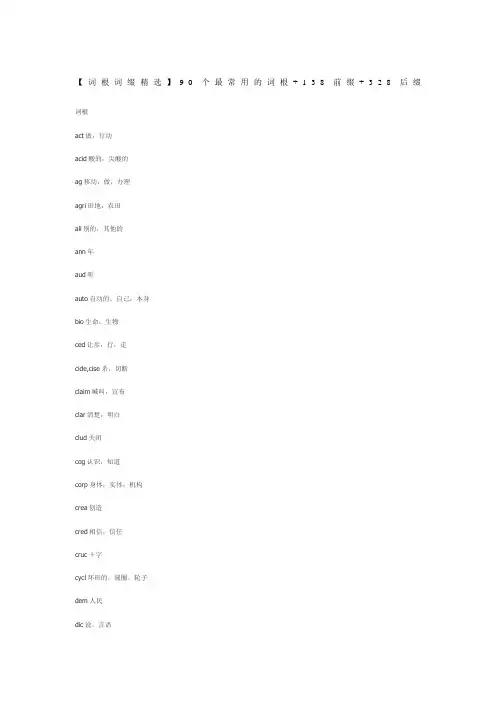
【词根词缀精选】90个最常用的词根+138前缀+328后缀词根act做,行动acid酸的,尖酸的ag移动,做,办理agri田地,农田ali别的,其他的ann年aud听auto自动的,自己,本身bio生命,生物ced让步,行,走cide,cise杀,切断claim喊叫,宣布clar清楚,明白clud关闭cog认识,知道corp身体,实体,机构crea创造cred相信,信任cruc十字cycl环形的,圆圈,轮子dem人民dic说,言语fac,fact做,作fer带,拿来fin结果,终flect弯曲geo地grad步,走,级graph写,画,记录器grat使人高兴的grav重的helio太阳hemo血hibit持有,拿hum土,人类hydr水hypn睡眠,催眠idio特殊的,专有的ject投掷,躺下lect选,收leg法律liber文字,字面loc地方log言语,词magn很大minu手medi中间mem记忆,纪念mini小migra迁徙,流动nov新number,numer数oper工作,操作pel推逐,驱pend悬挂,垂,待决phil爱phon声,音photo光pict画popul人,人民port运,带,拿pos放置,地点press压,按pur清,纯净rect正直rupt破sal盐sat足够sci知scope观察,看见sect切割sens感觉spect看sphere球,球体spir呼吸stereo固体的,立体的tend伸展,扩,绷紧ten使结合在一起,保持住,容纳,注意tract拖住,抽uni一,唯一的,统一的vers转向vest穿衣,衣服vict,vinc征服vis,vid看viv活的,生活voc声音,呼唤前缀1a-加在单词或词根前面,表示??不,无,非??2??a-加在单词前,表示??在...,...的??3??ab-,abs-??加在词根前,表示??相反,变坏,离去??等4??ab-,ac-,ad-,af-,ag-,an-,ap-,ar-,as-,at-??等加在同辅音字母词根前,表示一再??等加强意5??ad-??加在单词或词根前,表示??做.....,加强......??6??amphi-??表示??两个、两种??7??an-??在词根前,表示??不,无??8??ana-??表示??错误,在旁边,分开??9??ante-??表示??前面,先??10??anti-??表示??反对,相反??11??apo-??表示??离开,远离??12??auto-??表示??自动、自已??13??be-??构成动词,表示??使......成为?? 14??be-构成一些介词15??bene-??表示??善,好??16??bi-??表示??二个,两??17??by-??表示??在旁边,副的??18??cata-??表示向下,相反,离开??19??circum-??表示??环绕,周围??20??co-??表示??共同,通常放元音词根前21??col-,cor-??在同辅音词根前,表示??共同?? 22??com-,con-??表示??共同??23??contra-??表示??反对,相反??24??counter-??表示??反对,相反??25??de-??表示??去掉,变坏,离开,变慢,向下等26??de-??表示??使....成为,加强??等27??deca-??表示??十??28??deci-??表示??十分之一??29??demi-??表示??半??30??di-??表示??二个,双??31??di-??表示??使...变成,分开,离开??32??dia-??表示??穿过,二者之间??33??dif-??和辅音重复表示??不,否定,分开?? 34??dis-??表示??不,消失掉??35??dis-??表示??分开,分离??36??dys-??表示??坏,不良??37??e-,ef-??表示??出,出来,??38??em-,en-,??表示??进入...之中,包围?? 39??em-,en-,??表示??使.....进入状态??40??endo-??表示??内部??41??epi-??表示??在...上,在...周围,在...后面?? 42??eu-??表示??好,优秀??43??ex-??表示??出,出去??44??ex-??表示??前面的,前任的??45??exo-??表示??外部的,外面??46??extra-??表示??以外的,超过的??47??fore-??表示??前面,预先??48??hecto-??表示??百,许多??49??hemi-??表示??半??50??hepta-??表示??七??51??hetero-??表示??异类,异种??52??hexa-??表示??六??53??holo-??表示??全部'54??homo-??表示??同类的??55??hyper-??表示??超过,太多??56??hypo-??表示??下面,次等??57??il-,ir-??辅音重复表示??不,无??58??il-,ir-??表示??使.....成为,进入?? 59??im-,in-??表示??不,无,非?? 60??im-,in-??表示??向内,进入?? 61??inter-??表示??在.....之间,相互?? 62??intra-??表示??在内,内部?? 63??intro-??表示??向内,入内?? 64??iso-??表示??等,同??65??kilo-??表示??一千??66??macro-??表示??宏传,大?? 67??mal-;male??表示??坏,恶???? 68??meta-??表示??超过,改变?? 69??micro-??表示??微,小??70??milli-??表示??千,千分之一?? 71??mini-??表示??小??72??mis-??表示??错误,坏?? 73??mono-??表示??单个,一个?? 74??multi-??表示??多,很多?? 75??neo-??表示??新的??76??non-??表示??不,非??77??ob-??表示??逆,倒,加强意义?? 78??octa-??表示??八;亦作octo 79??omni-??表示??全部,到处?? 80??out-??示??超过,过度??81??out-??表示??出去,过时?? 82??over-??表示??过度,过份??83??over-??表示??翻转??84??over-??表示??在...之上?? 85??paleo-??表示??古,旧?? 86??pan-??表示??广泛的??87??para-??表示??半,类似,辅助?? 88??para-??表示??旁边??89??para-??表示??降落伞?? 90??pen-??表示??近似,差不多?? 91??penta-??表示五??92??per-??表示??贯穿,自始至终?? 93??per-??表示??假,坏??94??peri-??表示??周围,靠近?? 95??poly-??表示??多??96??post-??表示??在后面??97??post-??表示??邮件,邮政?? 98??pre-??表示??...前的,预先?? 99??pro-??表示赞同,亲...?? 100??pro-??表示??向前,在前?? 101??pro-??表示??很多...?? 102??proto-??表示??原始...?? 103??pseudo-??表示??假,伪?? 104??quadri-,quadru-??表示??四?? 105??quasi-??表示??类似,准?? 106??re-??表示??向后,相反?? 107??re-??表示??一再,重新??108??retro-??表示??向后,倒退??109??se-??表示??分开,离开,区别开??110??semi-??表示??半??111??sept-,septi-??表示??七??112??sex-,sexi-??表示??六??113??step-??表示??后,继或前夫(妻)所生??114??stereo-??表示??立体??115??sub-??表示??在下面,次一等,副手??116??sub-??表示??接近,靠近??117??suc-,suf-,sup-,sur-??等辅音重复表示??在...下面?? 118??super-??表示??在...上面??119??super-??表示??超级,超过,过度??120??supra-??表示??超...??121??sur-??辅音不重复表示??超过,在上面?? 122??sus-??表示??在...下面??123??sym-,syn-??表示??共同,相同??124??tetra-??表示四??125??trans-??表示??横过,越过??126??trans-??表示??变换,改变';转移??127??tri-??表示??三??128??twi-??表示二、两??129??ultra-??表示??极端??130??ultra-??表示??超出,超过??131??un-??表示??不,无,非,没有??132??un-??表示??打开,解开,弄出??133??under-??表示??在...下,在...之内?? 134??under-??表示??不足,不够??135??under-??表示??副手3136??uni-??表示??一个、单一??137??vice-??表示??副??138??with-??表示??向后,相反?后缀139??-ability??表名词,能...;性质?? 140??-able??表形容词,可...的,能...?? 141??-ably??表副词,能...地??142??-aceous??表形容词,具有...特征的?? 143??-acious??表形容词,有特征的,多...的?? 144??-acity??表名词,有...倾向??145??-acle??表名词,??...物品,状态?? 146??-acy??表名词,??...性质,状态?? 147??-ad??表名词,...东西,状态?? 148??-ade??表名词,表示状态,物品?? 149??-ade??表示个人或集体??150??-age??表示:费用??151??-age??表示场所,物品??152??-age??名词后缀,表示状态,总称?? 153??-ain??表名词,...人??154??-air??表名词,人、物??155??-aire??表名词,...人??156??-al??表形容词,...的??157??-al??表名词,人,物,状态?? 158??-ality??表名词,状态,性质?? 159??-ally??表副词,由al+ly构成,...地?? 160??-an??表名词和形容词,...地方,...人?? 161??-ance??表名词,性质,状况?? 162??-aneity??表名词,表示性质,状态?? 163??-aneous??表形容词,...有;...特征的?? 164??-ant??表形容词,...的??165??-ant??表名词,...人??166??-ant??表名词,...剂??167??-ar??表形容词,...的??168??-ard??表名词,不好的人??169??-arian,??表形容词或名词,...的(人)?? 170??-arium??表名词,地点,场所?? 171??-ary??表名词,人,场所,物?? 172??-ary??表形容词,...的??173??-ast??表名词,...人,物??174??-aster??表名词,不怎么样的人?? 175??-ate??表动词,做,造成??176??-ate??表形容词,具有...的?? 177??-ate??表名词,人或地位??178??-atic??表形容词,有...性质的?? 179??-ation??表名词,行为,过程,结果?? 180??-ative??表形容词,有...倾向(性质)的??181??-ator??表名词,通常由ate结尾的动词而来,做事的人或物?? 182??-atory??表名词场所,地点??183??-atory??表形容词,有...性质的??184??-cy??表名词,也作-acy,??性质,状态??185??-dom??表名词,状态或领域??186??-ee??表名词,被动或主动的人??187??-eer??表名词,...人员??188??-el??表名词,人或物??189??-en??表动词,变成??190??-en??表形容词,由...制成的,通常加在名词后面191??-en??表名词,人或物??192??-ence??表名词,性质,状态??193??-ency表名词,ence的变体194??-enne??表名词,女性??195??-ent??表形容词,...的??196??-ent??表名词,...药剂??197??-ent??表名词,...人??198??-eous??表形容词,有...的??199??-er??表动词,反复做??200??-er??表名词,物品,机器??201??-er??表名词,...人??202??-ern??表形容词,...方向的??203??-ern??表名词,...场所??204??-ery??表名词,场所,地点??205??-ery??表名词,行为,情况??206??-esque??表形容词,如...的??207??-ess??表名词,女性,雌性??208??-et??表名词,小东西??209??-etic??表形容词,属于...的??210??-ette??表名词,小的东西或状态??211??-ety??表名词,状态??212??-eur??表名词,...人??213??-faction??表名词,达到的状态,由-fy转化而来214??-fic??表形容词,产生...的??215??-fication表名词,由fic变化而来216??-fier??表名词,人或物,由-ify转化而来217??-fold??表形容词或副词,倍,双重?? 218??-form??表形容词,有...形状的??219??-ful??表形容词,有...的??220??-ful??表名词,满,量??221??-fy??表动词,...化,成为...,更多时候作-ify?? 222??-hood??表名词,时期,性质等??223??-ia??表名词,某种病??224??-ia??表名词,总称,状态??225??-ial??表形容词,有...的??226??-ian??表名词,某种人??227??-ian??表形容词,??...国家的??228??-ibility??表名词,具备...性质的??229??-ible??形容词??能...的??230??-ic??表形容词,??....的,有时作-tic231??-ic??表名词,某种药??232??-ic??表名词,人或学科??233??-ical??表形容词,...的??234??-ice??表名词,行为,状态??235??-ics??表名词,学科,学术??236??-id??表形容词,如...的??237??-ie??表名词,小东西或人??238??-ier??表名词,人或物??239??-ile??表形容词,...的??240??-ile??表名词,物体??241??-ine??表形容词,...的??242??-ine??表名词,人或女人??243??-ine??表名词,状态,药物等??244??-ing??表形容词,正...的,令人...的??245??-ing??表名词,行业??246??-ing??表名词,物品??247??-ing??表名词,状态??248??-ion??表名词,动作或状态分为--sion和--tion两种249??-ion??表示某种物,用品??250??-ior??表形容词,较...的??251??-ious??表形容词,....的??252??-ise??表动词后缀,和-ize相同,是-ize的变体,...化?? 253??-ise??表名词,物品,状态??254??-ish??表形容词,象...一样,有的...,通常放在一具体名词后256??-ish表示国家的或语言257??-ism??表示??学术或学术流派??258??-ism??表示??行为,现象,状态??259??-ism??表示??疾病??260??-ism??表示??具备某种性质??261??-ism??名词,表示??各种主义,宗教??262??-ist??表名词,表示信仰者,专家或从事人??263??-ist以-ist结尾的单词,不少同时可做名词和形容词用。

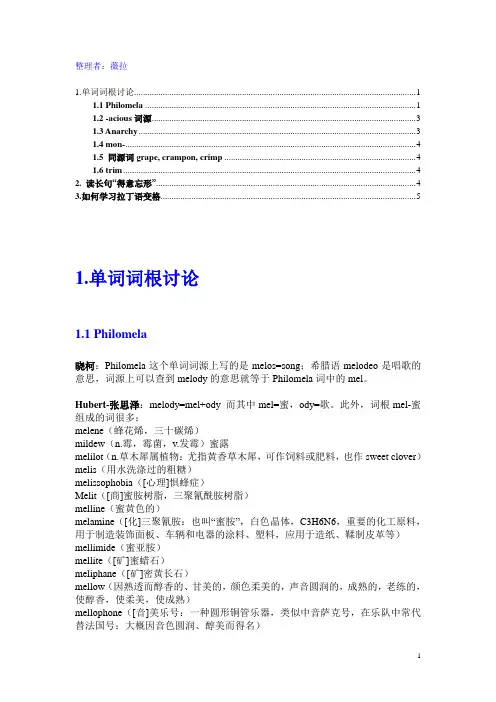
整理者:薇拉1.单词词根讨论 (1)1.1 Philomela (1)1.2 -acious词源 (3)1.3 Anarchy (3)1.4 mon- (4)1.5 同源词grape, crampon, crimp (4)1.6 trim (4)2. 读长句“得意忘形” (4)3.如何学习拉丁语变格 (5)1.单词词根讨论1.1 Philomela晓柯:Philomela这个单词词源上写的是melos=song;希腊语melodeo是唱歌的意思,词源上可以查到melody的意思就等于Philomela词中的mel。
Hubert-张思泽:melody=mel+ody 而其中mel=蜜,ody=歌。
此外,词根mel-蜜组成的词很多:melene(蜂花烯,三十碳烯)mildew(n.霉,霉菌,v.发霉)蜜露melilot(n.草木犀属植物:尤指黄香草木犀,可作饲料或肥料,也作sweet clover)melis(用水洗涤过的粗糖)melissophobia([心理]惧蜂症)Melit([商]蜜胺树脂,三聚氰酰胺树脂)melline(蜜黄色的)melamine([化]三聚氰胺:也叫“蜜胺”,白色晶体,C3H6N6,重要的化工原料,用于制造装饰面板、车辆和电器的涂料、塑料,应用于造纸、鞣制皮革等)mellimide(蜜亚胺)mellite([矿]蜜蜡石)meliphane([矿]密黄长石)mellow(因熟透而醇香的、甘美的,颜色柔美的,声音圆润的,成熟的,老练的,使醇香,使柔美,使成熟)mellophone([音]美乐号:一种圆形铜管乐器,类似中音萨克号,在乐队中常代替法国号;大概因音色圆润、醇美而得名)hydromel(蜂蜜酒:水和蜂蜜的混合物,混合物发酵时变成蜂蜜酒)oenomel(蜂蜜葡萄酒:一种古希腊饮料,含有蜂蜜和酒)philomel(n.夜莺)Philomela(菲洛梅拉:雅典公主,被她姐夫忒瑞俄斯强奸后,又遭姐姐浦洛思的报复,后在逃离忒瑞俄斯途中,被变成一只燕子或夜莺)城市稻草人:在古希腊语中,歌曲、诗歌一般也被称为aoede(比如缪斯三女神中就有歌唱女神Aoede【歌唱】),有时元音合并为oide或ode(元音合并现象在古希腊语中经常出现,具体的合并方法请参见信德麟老师的《拉丁语和希腊语》中希腊语语音解说部分),我们所说的悲剧tragedy即源于希腊语中的tragodia,由山羊tragos和歌曲oide组成,表示【山羊之歌】,这和古希腊悲剧的表现形式有一定的关系,看过索福克勒斯《俄狄浦斯王》的朋友应该对剧中和主人公心声对白的歌队印象很深吧。
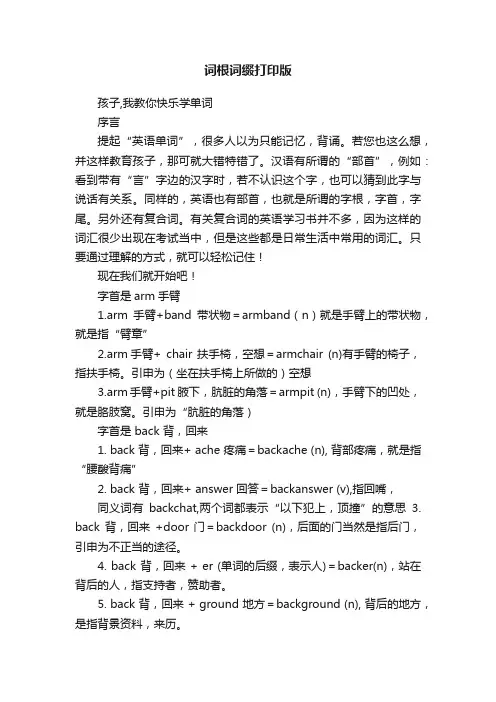
词根词缀打印版孩子,我教你快乐学单词序言提起“英语单词”,很多人以为只能记忆,背诵。
若您也这么想,并这样教育孩子,那可就大错特错了。
汉语有所谓的“部首”,例如:看到带有“言”字边的汉字时,若不认识这个字,也可以猜到此字与说话有关系。
同样的,英语也有部首,也就是所谓的字根,字首,字尾。
另外还有复合词。
有关复合词的英语学习书并不多,因为这样的词汇很少出现在考试当中,但是这些都是日常生活中常用的词汇。
只要通过理解的方式,就可以轻松记住!现在我们就开始吧!字首是arm手臂1.arm手臂+band带状物=armband(n)就是手臂上的带状物,就是指“臂章”2.arm手臂+ chair 扶手椅,空想=armchair (n)有手臂的椅子,指扶手椅。
引申为(坐在扶手椅上所做的)空想3.arm手臂+pit 腋下,肮脏的角落=armpit (n),手臂下的凹处,就是胳肢窝。
引申为“肮脏的角落)字首是 back 背,回来1. back 背,回来+ ache 疼痛=backache (n), 背部疼痛,就是指“腰酸背痛”2. back 背,回来+ answer 回答=backanswer (v),指回嘴,同义词有backchat,两个词都表示“以下犯上,顶撞”的意思3. back 背,回来+door门=backdoor (n),后面的门当然是指后门,引申为不正当的途径。
4. back 背,回来 + er (单词的后缀,表示人)=backer(n),站在背后的人,指支持者,赞助者。
5. back 背,回来 + ground 地方=background (n), 背后的地方,是指背景资料,来历。
6.back 背,回来 + seat 座位=backseat (n),这里可不是指有靠背的椅子,而是指后座,在口语有“居于次要地位”的意思。
字首是 ball 球1 ball 球 +boy男孩=ballboy(n),替打网球,高尔夫球的人拣球的男性工作人员。
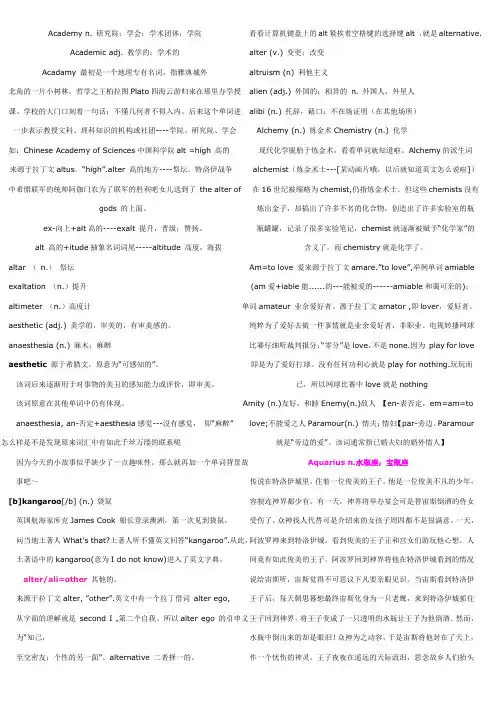
Academy n. 研究院;学会;学术团体;学院Academic adj. 教学的;学术的Acadamy 最初是一个地理专有名词,指雅典城外北角的一片小树林。
哲学之王柏拉图Plato 四海云游归来在那里办学授课。
学校的大门口刻着一句话:不懂几何者不得入内。
后来这个单词进一步表示教授文科、理科知识的机构或社团----学院、研究院、学会 如:Chinese Academy of Sciences 中国科学院alt =high 高的 来源于拉丁文altus ,“high”.alter 高的地方----祭坛。
特洛伊战争 中希腊联军的统帅阿伽门农为了联军的胜利吧女儿送到了 the alter ofgods 的上面。
ex-向上+alt 高的----exalt 提升,晋级;赞扬。
alt 高的+itude 抽象名词词尾-----altitude 高度,海拔altar ( n.) 祭坛 exaltation (n.)提升 altimeter (n.)高度计aesthetic (adj.) 美学的,审美的,有审美感的。
anaesthesia (n.) 麻木;麻醉aesthetic 源于希腊文,原意为“可感知的”。
该词后来逐渐用于对事物的美丑的感知能力或评价,即审美。
该词原意在其他单词中仍有体现。
anaesthesia, an-否定+aesthesia 感觉---没有感觉, 即“麻醉” 怎么样是不是发现原来词汇中有如此千丝万缕的联系呢因为今天的小故事似乎缺少了一点趣味性。
那么就再加一个单词背景故事吧~[b]kangaroo [/b] (n.) 袋鼠英国航海家库克James Cook 船长登录澳洲,第一次见到袋鼠,问当地土著人What’s that?土著人听不懂英文回答“kangaroo”.从此, 土著语中的kangaroo(意为I do not know)进入了英文字典。
alter/ali=other 其他的。
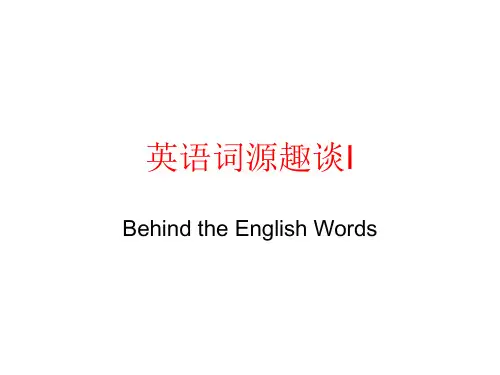

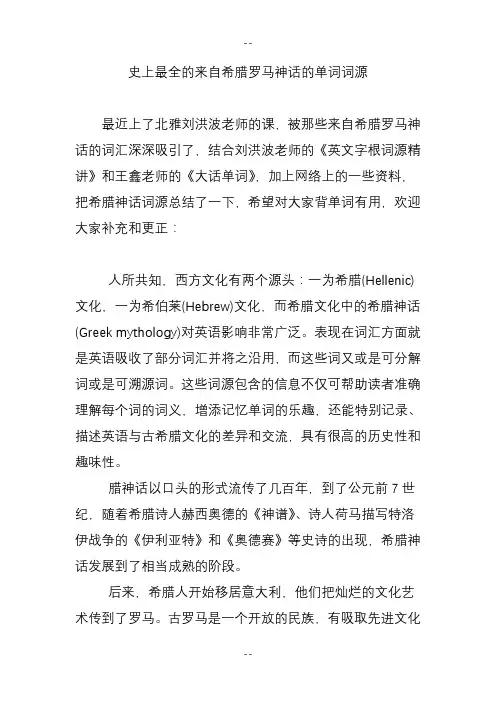
史上最全的来自希腊罗马神话的单词词源最近上了北雅刘洪波老师的课,被那些来自希腊罗马神话的词汇深深吸引了,结合刘洪波老师的《英文字根词源精讲》和王鑫老师的《大话单词》,加上网络上的一些资料,把希腊神话词源总结了一下,希望对大家背单词有用,欢迎大家补充和更正:人所共知,西方文化有两个源头:一为希腊(Hellenic)文化,一为希伯莱(Hebrew)文化,而希腊文化中的希腊神话(Greek mythology)对英语影响非常广泛。
表现在词汇方面就是英语吸收了部分词汇并将之沿用,而这些词又或是可分解词或是可溯源词。
这些词源包含的信息不仅可帮助读者准确理解每个词的词义,增添记忆单词的乐趣,还能特别记录、描述英语与古希腊文化的差异和交流,具有很高的历史性和趣味性。
腊神话以口头的形式流传了几百年,到了公元前7世纪,随着希腊诗人赫西奥德的《神谱》、诗人荷马描写特洛伊战争的《伊利亚特》和《奥德赛》等史诗的出现,希腊神话发展到了相当成熟的阶段。
后来,希腊人开始移居意大利,他们把灿烂的文化艺术传到了罗马。
古罗马是一个开放的民族,有吸取先进文化的非凡才能,很快,他们就把希腊神话吸收过来,并赋予每个神以一个罗马名字,这就是为什么“宙斯”又叫“朱庇特”,“丘比特”又是“厄洛斯”的原因了。
希腊罗马神话就像神话故事中的灵泉,滋养着英语的词汇,产生了许许多多美妙动人的词汇故事,增强了英语的生命力。
chaos(混乱):来源于最原始的天神Chaos(卡厄斯),又称为“混沌之神”。
是他创造了天地,就和盘古开天辟地差不多。
geograph(地理学):英语中很多以G开头的单词都和地球有关,geo-这个词根就是地球的意思,它来自大地之母该亚Gaia,例如:geograph(地理学)/geometry(几何学——测量大地的科学)/George(最初含义是土地工作者)Atlas(地图册):希腊神话中Titans(泰坦)巨神之一,因背叛Zeus(宙斯)被罚在世界的西边尽头以双肩扛天。
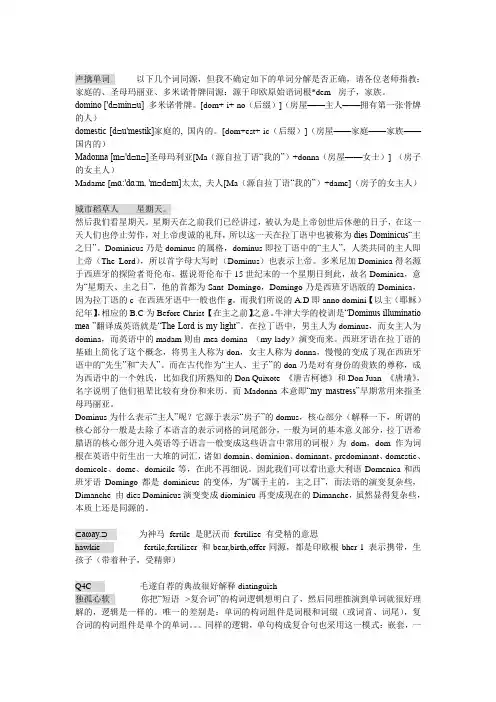
声擒单词以下几个词同源,但我不确定如下的单词分解是否正确,请各位老师指教:家庭的、圣母玛丽亚、多米诺骨牌同源:源于印欧原始语词根*dem- 房子,家族。
domino ['d□min□u] 多米诺骨牌。
[dom+-i+-no(后缀)](房屋——主人——拥有第一张骨牌的人)domestic [d□u'mestik]家庭的, 国内的。
[dom+est+-ic(后缀)](房屋——家庭——家族——国内的)Madonna [m□'d□n□]圣母玛利亚[Ma(源自拉丁语“我的”)+donna(房屋——女士)] (房子的女主人)Madame [mɑ:'dɑ:m, 'm□d□m]太太, 夫人[Ma(源自拉丁语“我的”)+dame](房子的女主人)城市稻草人星期天。
然后我们看星期天。
星期天在之前我们已经讲过,被认为是上帝创世后休憩的日子,在这一天人们也停止劳作,对上帝虔诚的礼拜,所以这一天在拉丁语中也被称为dies Dominicus“主之日”。
Dominicus乃是dominus的属格,dominus即拉丁语中的“主人”,人类共同的主人即上帝(The Lord),所以首字母大写时(Dominus)也表示上帝。
多米尼加Dominica得名源于西班牙的探险者哥伦布,据说哥伦布于15世纪末的一个星期日到此,故名Dominica,意为“星期天、主之日”,他的首都为Sant Domingo,Domingo乃是西班牙语版的Dominica,因为拉丁语的c 在西班牙语中一般也作g。
而我们所说的A.D即anno domini【以主(耶稣)纪年】,相应的B.C为Before Christ 【在主之前】之意。
牛津大学的校训是“Dominus illuminatio mea ”翻译成英语就是“The Lord is my light”。
在拉丁语中,男主人为dominus,而女主人为domina,而英语中的madam则由mea domina (my lady)演变而来。
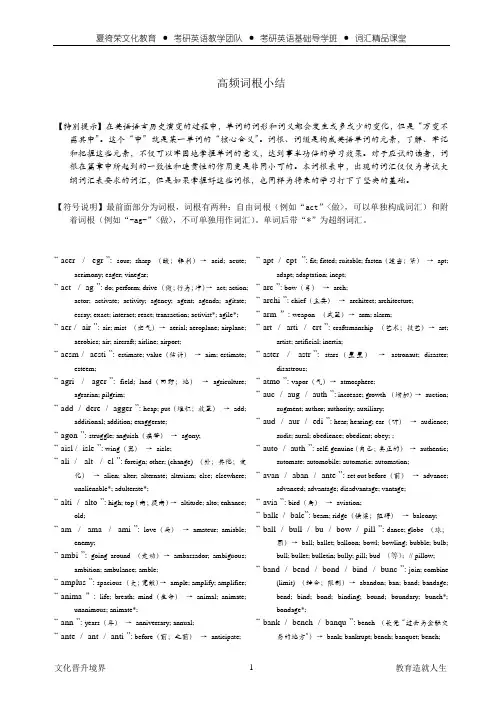
高频词根小结【特别提示】在英语语言历史演变的过程中,单词的词形和词义都会发生或多或少的变化,但是“万变不离其中”。
这个“中”就是某一单词的“核心含义”。
词根、词缀是构成英语单词的元素,了解、牢记和把握这些元素,不仅可以牢固地掌握单词的意义,达到事半功倍的学习效果。
对于应试的读者,词根在篇章中所起到的一致性和连贯性的作用更是非同小可的。
本词根表中,出现的词汇仅仅为考试大纲词汇表要求的词汇,但是如果掌握好这些词根,也同样为将来的学习打下了坚实的基础。
【符号说明】最前面部分为词根,词根有两种:自由词根(例如“act”<做>,可以单独构成词汇)和附着词根(例如“-ag-”<做>,不可单独用作词汇)。
单词后带“*”为超纲词汇。
“-acer- / -egr-”: sour; sharp (酸;锋利)→acid; acute;acrimony; eager; vinegar;“-act - / -ag-”: do; perform; drive (做;行为;冲)→act; action;actor; activate; activity; agency; agent; agenda; agitate;essay; exact; interact; react; transaction; activist*; agile*; “-aer / -air-”: air; mist (空气)→aerial; aeroplane; airplane;aerobics; air; aircraft; airline; airport;“-aesm / -aesti-”: estimate; value(估计)→aim; estimate;esteem;“-agri- / -ager-”: field; land(田野;地)→agriculture;agrarian; pilgrim;“-add- / -dere- / -agger-”: heap; put(堆积;放置)→add;additional; addition; exaggerate;“-agon-”: struggle; anguish(痛苦)→agony;“-aisl / -isle-”: wing(翼)→aisle;“-ali- / - alt - / -el-”: foreign; other; (change) (外;其他;变化)→alien; alter; alternate; altruism; else; elsewhere;unalienable*; adulterate*;“-alti- / -alto-”: high; top(高;提高)→altitude; alto; enhance;old;“-am- / -ama- / -ami-”: love(爱)→amateur; amiable;enemy;“-ambi-”: going around (走动)→ambassador; ambiguous;ambition; ambulance; amble;“-amplus-”: spacious (大;宽敞)→ample; amplify; amplifier;“-anima-”: life; breath; mind(生命)→animal; animate;unanimous; animate*;“-ann-”: years(年)→anniversary; annual;“-ante- / -ant- / -anti-”: before(前;之前)→anticipate;“-apt- / -ept- ”: fit; fitted; suitable; fasten(适当;紧)→apt;adapt; adaptation; inept;“-arc-”: bow(弓)→arch;“-archi-”: chief(主要)→architect; architecture;“-arm-”: weapon(武器)→arm; alarm;“-art- / -arti- / -ert-”: craftsmanship(艺术;技艺)→art;artist; artificial; inertia;“-aster- / -astr-”: stars(星星)→astronaut; disaster;disastrous;“-atmo-”: vapor(气)→atmosphere;“-auc- / -aug- / -auth-”: increase; growth (增加)→auction;augment; author; authority; auxiliary;“-aud- / -aur- / -edi-”: hear; hearing; ear(听)→audience;audit; aural; obedience; obedient; obey; ;“-auto- / -auth-”: self; genuine(自己;真正的)→authentic;automate; automobile; automatic; automation;“-avan- / -aban- / -ante-”: set out before(前)→advance;advanced; advantage; disadvantage; vantage;“-avia-”: bird(鸟)→aviation;“-balk- / -balc”: beam; ridge(横梁;阻碍)→balcony;“-ball- / -bull- / -bu- / -bow- / -pill-”: dance; globe (球;圆)→ball; ballet; balloon; bowl; bowling; bubble; bulb;bull; bullet; bulletin; bully; pill; bud (等);// pillow; “-band- / -bend- / -bond- / -bind- / -bunc-”: join; combine (limit) (结合;限制)→abandon; ban; band; bandage;bend; bind; bond; binding; bound; boundary; bunch*;bondage*;“-bank- / -bench- / -banqu-”: bench(长凳“过去为金融交易的地方”)→bank; bankrupt; bench; banquet; bench;“-bar-”: stick; rod(长木条)→bar; barrel; embarrassment;“-bas- / -bass-”: of low height; pedestal (基础)→base;baseball; basic; basis; database;“-bat- / -bar- / -bell-”: club; hit (木棍;打击)→bar; barrel;barrier; bat; battery; battle; combat; debate; batter*;belligerent*; abate*; baton*; billiard*; rebuke*;“-bene- /-bon-”: good (好;善)→benefit; beneficial; bonus;“-bi- / -bin- / -bo-”: two; twice (二;两;双)→combine;binary; balance; bicycle; billion; biscuit; both; combination;combine;“-biblio-”: books(书)→Bible; bibliography;“-bill- / -bull-”: seal; document; boss (玉玺;印章)→bill;bulletin; bull; bully;“-bio- / -bi-”: life(生命)→biography; aerobics;“-blam- / -blasm-”: blaspheme(亵渎)→blame;blaspheme*;“-brac-”: arms(双臂)→brace; bracket; brake; embrace; “-bread- / -breed- / -brib-”: crumb; morsel (面包)→bread;breed; bribe; bribery;“-break- / -breach- / -brick-”:break(打破)→break;breach; brick; brisk;“-brev- / -brief-”: short (短;简)→brief; brevity;“-bri- / -brill-”: shine (闪耀)→bright; brighten; brilliant; “-cal- / -car- / -char-”: heat (热量)→calm; calorie; carbon;charcoal; coal;“-camp- / -champ-”: field; plain; battlefield(战场;田地)→camp; campus; campaign; champion;“-can- / -chan- / -cap- / -cat- / -chief-”: ①small vessel;tube; ②head; chief(小容器;管/ 头;首)→achieve;cabbage; can; canal; candy; canoe; cannon; cap; cape;capital; capitalism; captain; cattle; chapter; cheek; chef;chief; choke; escape; channel; cane*; canyon*; cunning*;uncanny*; cage; chimney; // kettle“-cap- / -cab- / -cip- / -cas- / -cach- / -chas- / -ceiv- / -cept- / -ceit- / -cup-”:take; catch; seize; realize;contain; hold(拿;抓;捕;握)→anticipate; accept;capture; captivity; cable; capable; capacity; capsule;captive; captivity*; case; cash; cashier; cassette; catch;cater; chase; conceive; concept; conception; cop; copy;deceive; deceit; except; exception; occupation; occupy;participate; perceive; prince; receipt; receive; reception;recipe; reciprocal; recover; recovery; susceptible;capricious*; capsize*; conceit*; recuperate*; apperceive*;caption*; covert*; disciple*; encapsulate*; precept*;preoccupy*; receptacle*; // seize; size;“-car- / -char-”: cart; carry; wagon; load(车;载)→car;career; cargo; carpenter; carriage; carrier; carry; cart;charge;“-card / -chart-”: paper(纸)→card; chart; charter;“-cav-”: cave; hollow(洞穴)→cave; cavity*; concave*; “-ceal- / -cel- / -cul-”: hide(躲藏)→conceal; occult*; “-cel- / -cell- / -celer-”: rise up; swift; high (升高;快速)→excel; excellent; accelerate; decelerate; culminate*;“-cent- / -cens- / -chant-”: sing; song; chant(歌唱)→accent; charm; chorus; incentive; cant*; enchant*;“-cent- / -cent-”: a hundred; hundredth(百;百分之一)→cent; centigrade; century; centimeter;“-cent- / centr-”: center(中心)→center; central; concentrate;eccentric;“-cern-”: mingle with; mix(混合)→concern; discern;discreet; decree*;“-cerp- / -carp-”: select; pluck(选择)→excerpt; scarce;scarcely;“-cert-”: ①certain; ②strive; work(确证/ 争取)→ascertain;certain; certainly; certainty; concert; uncertainty; certificate;certify; decertify*;“-cess- / -ceed- / -ced- / -ces-”: move; go(行,走,动)→access; ancestor; cease; cheese; concede; concession;exceed; exceedingly; excess; precede; precedent; preceding;predecessor; procedure; proceed; proceedings; process;procession; recede; succeed; success; successful;succession; successive; successor; incessant*; deceased*; “-chai- / cait-”: chain; link(联系)→chain;“-chiev- / -chef- / -chief-”: head; conclusion(头,首)→achieve; chef; chief; mischief;“-cid- / -cad- / -cas- / chans-”: fall(下降;降落;天意)→accident; case; casual; casualty; chance; cheat; coincide;coincidence; decay; incidence; incident; incidentally;occasion; occasionally; recidivism*; decadent*;“-circ- / -cycle-”: round; ring(圆;环)→bicycle; circle;circuit; circular; circulate; circumstance; circus; cycle;cylinder; recycle; search;“-cis / -cid-”: cut(剪,砍,剁)→cement; concise; decide;decision; precise; precisely; precision; scissors; suicide; “-cit- / -civ-”: citizen(公民)→citizen; city; civil; civilian;civilize; civilization;“-cite- / -cit-”: rouse; summon; excite; stimulate(唤;召;激)→cite; excite; excitement; exciting; recite; entice*;celebrate; celebrity; code; encode; decode;“-claim- / -clam-”: shout; call; appeal(呼,唤,争)→acclaim; claim; exclaim; proclaim; reclaim; declaim*; “-clar- / -clear-”: clear(清楚,清晰)→clarity; clear; declare;declaration;“-class-”: rank; fleet(队,级)→class; classify; classified;classification;“-clim- / -climb-”: ladder(梯)→climax; climb;“-clim- / -clin-”:incline; tend; bend(倾,弯)→climate;climax; decline; incline;“-clud- / -claus- / -clos-”: close; shut (关,闭,合)→clause;close; conclude; conclusion; disclose; enclose; enclosure;exclude; exclusive; include; inclusive; preclude; secluded*; “-cogn- / -quain- / -gnos- / -know- / -gnor- / -gna-”: to know perfectly(认知)→acquaintance; cognitive;acknowledge; knowledge; know; diagnosis; ignorance;ignorant; ignore; know; knowledge; narrative; noble; notice;noticeable; notify; notion; notorious; recognition; recognize;cognition*; quaint*;“-colo- / -cole- / -cult-”: farm; settlement; cultivate; inhabit (殖,植)→agriculture; colony; colonial; culture;cultivate; cult*; cull; coil; accumulate; cumulative;“-commo- / -commu-”: general; universal; share(共,普,享)→common; communicate; communication; community;“-contra- / -counter-”: against; opposite(反对,对抗)→contradiction; contrary; contrast; country;“-cord- / -cor- / -cour-”: heart; gut(心,内脏)→accord;cord; cordial; core; courage; discourage; encourage; record;recorder;“-coupl- / -cop-”: birth; pair(结子;连接)→couple; “-corp- / -corpus-”: body(身体)→corporate; corporation;incorporate;“-cosm- / -kosm-”: universe; order; world(宇宙,世界)→cosmic;“count”: count; calculate; compute(计,算,数)→account;accountant; count; counter; county; discount;“-coup- / -cop- ”: cut; to strike(剪,击)→coupon;“-cours- / -cor-/ -cur”: run; flow(跑,流)→corridor; course;current; currency; curriculum; discourse; excursion; hurry;incur; intercourse; occur; occurrence; recur; recourse*; “-covr- / -cover-”: cover over(覆盖)→cover; discover;uncover;“-creat”: make; produce(产生;创造)→create; creation;creativity; creature; creationism; recreate;“-cred”:credit; faith(相信)→credential; credit; discredit;credible; credulous; grant; incredible; creed*;“-cres / -creas- / -cruit-”: grow(增加,增长)→concrete;crew; decrease; increase; increasingly; recruit; crescent*;create(类别)“-crim-”: verdict; accusation;→crime; criminal;criminologist*;“-crimin- / -cris- / -crit- // -cros- / -crux-”: ①cross; ②divide; decide; able to discern(十字形;分开,区分)→cross; crucial; cruise; // crisis; criteria; discriminate;discrimination; crusade*;“-crop-”: sprout; craw (萌芽;芽)→crop; cruise;“-crud- / -crud- / -crue-”: press; hurry(血腥,粗糙;敦促;急迫)→crude; cruel; cruelty; crowd;“-cuit- / -cuis-”: cook(烹饪)→biscuit;“-cum(u)- / -cil-”: heap up(堆积)→accumulate; council;coil; cull*;“-cur- / -car- / -cher-”: care; dear(关心;珍爱)→accurate;accuracy; care; careful; caress; charity; cherish; cure;curious; secure; security; charity*; precarious*;“-cus- / -curs-”: curse(诅咒)→accuse; curse; excuse; “-damn- / -demn- / -temn-”: damn(谴责)→condemn;contempt; damage; damn; danger;“-day- / -dai-”: day(日;天)→dial; daily; day; diary; “-dec- / -deci-”: ten(十)→dean; decade; December;decimal;“-dece- / -deco-”: ornament(教堂装饰)→decent; decorate; “-demo-”: people; folk(民;民众)→democracy; democratic;epidemic; demography*;“-dense-”: thick(厚;浓)→condense; dense; density; “-deterior-”: worse(更糟糕)→deteriorate;“-di- / -du- / -doub- / -dub-”: two(二,两,双;怀疑,可疑)→dilemma; double; dubious; duplicate; dual*; doubt;doubtful; undoubtedly;“-dic-”: fix (固定;决定)→addict;“-dic / -diti- / -dex- / -doc- / -dox-”: ①speak; ②teach;show; belief(说;教,信仰)→condition; contradict;contradiction; contradictory; dedicate; dictate; dictation;discipline; index; indicate; indication; predict; verdict; //doctor; doctrine; document; orthodox; paradox; indict*;jurisdiction*; docile*; dogma*;“-digni- / -divi- / -divu- / -dei-”: god; worth; merit(神;价值,优点)→divine; dignity; indignity*; disdain*;“-domai- / -domi-”: lord(贵族;封地)→domain; dome;domestic; dominant; dominate; domineering*; dauntless*; “-dorm / -diz- / -doz- / -daz-”: sleep; quiet; lull; weak(睡眠;眩目;安静)→dazzle; dizzy; doze; dormant;dormitory; daze*;“-dot / -dote- / -don- / -dat- / -dos- / -dit-”: give; grant(给予;授予)→anecdote; donate; dote; data; date; dose;dosage; edit; editor; edition; editorial; endow; pardon;render; tradition; treason; update; up-to-date;“-drain- / -dry- / -drou-”: dry(干燥)→drain; draught; dry;drought; drug; draw; dredge*;“-dram- / -dras-”: do; perform(做;履行)→drama;dramatically; drastic;“-dress-”: direct; straight; arrange(直接;安排)→address;dress;“-drift- / -drive-”: float(漂移)→drift;“-duc- / -duct- / -doc-”: lead(领,导)→conduce; conduct;deduce; dock; educate; education; induce; introduce;introduction; produce; product; production; productivity;reduce; reduction; reproduce; seduce*;“-due- / -dev- / -deb-”: owe(欠)→debt; due; duty;endeavor; undue; unduly*; dues*;“-dur- / -duur-”: last; harden(延续;艰辛)→door; durable;duration; during; endurance; endure; indulge;“-dare- / -durr- / -turr-”: venture; dare(冒险)→dare;“-ease- / -aise-”: comfort; to relieve(安逸;减轻)→disease;ease; easy; uneasy;“-eco-”: life; environment; money(生命;环境;金钱)→ecology; economic; economical; economics; economy;“-equa-”: to equal; level(平等;等同)→adequate; equal;equality; equation; equivalent;“-ern-”: energetic; activity(能量;活动)→earnest; energy; “-err-”: wanderer; to err(偏移;过错)→erroneous; error; “-esse- / -ens- / -esse- / -est-”: to exist; to be(存在)→absent; absence; entity; essence; interest; presence; present;presently; represent; representative;“-eston- / -stun-”: strike with thunder(打击;惊异)→astonish; pierce;“-et- / -eat- / -ed-”: eat(吃)→eat; eatable; edible;“-ethn- / -ethno-”: nation; race(民族;种族)→ethnic; “-exam- / -exem-”: weigh; take out(掂量;取样)→exam;examination; example; sample;“-exo- / -ext-”: outside(在外)→exotic; exterior; external;extra; extreme;“-fabr- / -forg-”: workshop; craftsman(制作;工艺)→fabric;fabricate; forge;“-face- / -fac- / -fect- / -fic- / -fy / -feas- / -fair- / -feat-”: to do; to make; // easy; facile(做,作,制;容易)→affair;affect; benefit; beneficial; to certificate; defeat; defect;deficient; effect; effective; efficiency; efficient; exemplify;face; fact; factor; factory; fashion; fashionable; feasible;feat; feature; fiction; infect; infection; office; officer;official; perfect; perfection; proficiency; profit; profitable;suffice; sufficient; superficial; surface; faction*; // difficult;difficulty; facilitate; facility; faculty; facet*; prefecture*;profiteering*; // fatigue;“-fail- / -fal- / -faut-”: to disappoint; deceitful(失误,失望;欺骗)→fail; failure; fall; false; fault; fell;“-faint- / -faind-”: sluggish; feigned; idle(闲游)→faint; “-fari- / -fame- / -fate- / -face- / fabu- / -phec- / -fess- / -fit-”: speak; narrative(说,讲,谈)→confess;confession; fable; fabulous; fame; famous; fate; fatal;infant; preface; profess; profession; professor; professional;prophet; fabulous* fudge*;“-fasc-”: bewitch; charm; an enchantment(着迷)→fascinate; “-fav-”: protect; show kindness to(庇护;善意)→favor;favorite; favorite;“-feb-”: weep; to be lamented(哀泣)→feeble;“-fend- / -fence- / -fens-”: protect; shield; strike(保护)→defend; fence ; offence; offend; offensive;“-fer- / -far- / -fert- / -ford-”:bring; take; carry; to bear (birth) (带,拿,载,承担)→afford; affordable*; confer;conference; cf; differ; different; difference; differentiate;ferry; fertile; indifferent; infer; inference; metaphor; offer;prefer; preferable; preference; refer; reference; suffer;transfer; translate; deferential*;“-feri- / -feru-”: low; below(漂移)→inferior;“-fid- / -fait- / -fed-/ -fy-”: trust; confidence(信任,相信)→confide; confident; confidence; defy; defiance; faith;faithful; federal; federation; diffident*;“-fier- / -feru-”: wild; savage(野蛮)→fierce;“-fil-”: son; brother(儿子,兄弟)→affiliate;“-fin-”: end; limit(端点;限制)→confine; confinement;define; definite; definition; definitely; fine; final; finance;financial; fine; finish; finite; infinite;“-fir- / -foc- / -fue- / -fur-”: fire; rage(火,热;愤怒)→fire;fiery; focus; fuel; furious; furnace; fury;“-firm- / firm / -farm-”: make firm; settle(稳健,稳固)→affirm; confirm; farm; firm;“-flat- / -flar-”: blow(吹)→inflate; inflation; deflate*;deflation*;“-flex- / -flect-”: bend(弯曲,折)→flexible; reflect;reflection;“-flic-”: strike →(打击,撞击)conflict; afflict; inflict*; “-flu- / flu / -flo-”: flow; wave(流动;波动)→affluent; float;flow; flood; fluctuate; fluent; fluid; flush; fly; influence;influential; overflow; superfluous;“-fod- / -fos-”: dug up; dig(挖,掘)→fossil;“-fori-”: outside (外部;外围)→foreign; foreign; forest;forum;“-form-”: form; shape; fashion(形式,形状,方式)→conform;conformist; form; formal; format; formation; formula;formulate; inform; reform; transform; deform*;“-fort- / -fors-”:①chance ②strong(天意;强大,力量)→fortune; fortunate; misfortune; // comfort; comfortable;uncomfortable; effort; enforce; force; reinforce; fortitude*;fortress*; fortify*;“-fostr-”: feed; food(食物;滋养)→foster;“-frac- / -frag-”: break(打破,破裂)→fraction; fracture;fragile; fragment;“-fray”: frighten; disturb(惊异;打扰)→afraid;“-front”: forehead(额头)→confront;“-func- / -fung-”: perform; discharge(功用)→function; “-fund- / -found-”: bottom; deep; melt; cast(底;深)→found;foundation; fund; fundamental; profound;“-fus- / -fut- / -fund-”: mingle; mix; pour; beat(混合;倾倒)→confuse; diffuse; fund; fuse; futile; refund; refuse;refusal; transfuse*;“-gage-”: pledge(保证,誓言,抵押)→engage; engagement;“-gard- / -guard-”: look; watch; see(关注,认知)→disregard; guard; regard; regarding; regardless;“-genus- / -gene- / -gine-”: origin; race; produce; breed;talent; contrive; kind(起源;产生;创造;种类)→degenerate; engine; engineer; engineering; gender; gene;general; generalize; generate; generation; generator;generous; genetic; genius; genuine; homogeneous;ingenious; congenital*; genre*;“-gest-”: carry; to bear; bring(载;拿)→digest; gesture;register; suggest; suggestion; gesticulate*;“-graph- / -gram-”: writing(写)→bibliography; biography;autobiography; diagram; program; calligraphy*;“-grat- / -gree- / -grac-”: rejoice; pleasure(快乐;高兴)→agree; agreement; agreeable; congratulate; disgrace; grace;grateful; gratitude; greet; greeting; ingratiate*; gratis*; “-grav- / -grave- / -grie- / -gret-”: make heavier(变得沉重)→aggravate; grave; gravity; grieve; grief; regret;grievance*; grim;“-gress- / -grad- / -gree- / -greg- / -gru-”: step; go; flock (步伐;走;聚合)→aggressive; aggression; congress;degree; grade; gradual; graduate; progress; progressive;segregate; upgrade; transgress*; gregarious*;“-guise-”: manner(方式)→disguise;“-gust- / -gous-”: taste(品味;胃口)→disgust;“-hab- / -hib-”: hand; hold (forth); have; living condition; dress;character(拿;持;生存;穿戴)→able; disable; exhibit;habit; habitat; heave; heavy; inhibit; prohibit; rehabilitate*;inhibit*; cohabit*;“-hale-”: whole; pull; draw; breathe(吸;拉)→haul; heal;health; healthy; inhale;“-hanc- / -haut-”: high; raise(高度)→enhance;“-hand- / -haur- / -haus-”: seize; draw(手;取;拿;抓)→exhaust; hand; handbook; handicap; handkerchief; handle;handsome; handwriting; handy; hint; harness;“-her- / -hes-”: to stick to(粘,贴)→adhere; cohere; coherent;cohesive; hesitate;“-host- / -hosp-”: guest; inn; enemy(旅店,客人;敌人)→hospital; hospitality; host; hostess; hostage; hotel;“-iden-”: same (完全相同)→identical; identify;identification; identity;“-imi- / -ima-”: copy; representation (复制;代表)→image;imaginary; imagination; imaginative; imagine; imitate; “-initi- / -ire- / -it-”: initiate; go(开始;行走)→commence;exit; initial; initiate; initiative; issue; perish; transient;transition;“-insul- / -isol- / -isle-”: made into an island(岛屿;孤立)→insulate; isolate; peninsula;“-jac- / -jec- / -ject-”: to lie; throw(位置;扔向)→adjacent;adjective; eject; inject; jet; object; objection; objective;project; projector; reject; subject; subjective; deject*;conjecture*;“-jun- / -jon- / -junc-”: add; join; unite(加入;增加;联合)→conjunction; junction; jungle; join; adjoin; adjunct; “-just- / -jur- / -judg- / -judi-”: just; right; law(公正;法律;权利)→just; adjust; injury; judge; judgment; judicious;jury; just; justice; justice; justify; prejudice; ;“-jut / -juv-”: help(帮助;用途)→aid;“-lab- / -lap-”: fall; slip(滑倒;闪失)→collapse; elapse; lap;lapse;“-labor-”: toil; work(工作,辛苦)→elaborate; lab; laboratory;labor;“-lais- / -lax- / lac-”: to leave; slack; lax; loosen(松开;离开)→delay; elastic; lace; lack; lazy; lease; let; loose; loosen;relax; relay; release; relish; slack; unleash*; // deliver;“-langu- / -lingu-”: tongue; language(舌头;语言)→language; linguistic;“-leg- / -leag- / -lec- / -lig- / -lite-”: choose; select(挑选;精选)→colleague; collect; collection; collective; diligent;elect; elegant; eligible; elite; intellectual; intelligence;intelligent; intelligible; league; neglect; negligible;recollect; select; selection; negligent; ;“-lex - / -leg- / -lig- / -alier- / -alo-”: law; binding; tie(法律;捆绑;限制)→ally; alliance; alloy; colleague; illegal;legal; league; legislation; legislative; legitimate; leisure;liability; liable; loyal;; loyalty; obligation; oblige; privilege;rally; reliant; reliable; rely; religion; religious; liaison*;litigant*;“-lev- / -lieve-”: light; lighten; raise(减轻;提高)→alleviate;relief; elevate; elevator; lever; levy; relevant; relief; relieve; “-libr- / -leve-”: to weigh; scales(衡量;天平)→deliberate;level;“-lic- / -lect-”:pleasure(愉快;愉悦)→delicate; delicious;delight; delectable*; relics*; relish*;“-lit- / -litte- / -lege-”: letters; reading and writing(字母;读写能力)→illiterate; lecture; legend; lesson; letter; literacy;literally; literary;“-loc- / -lic- /-liber - / -libr-”: place; to be allowed; freedom (地点;应允;自由)→allocate; allow; couch; leisure;license; local; locality; locate; location; locale*; // deliver;liberal; liberate; liberty; // locomotive;“-logos- / -log- / -logue- / -leg- / -lect-”: speech; cite; ratio (话语;引证;比例)→allege; allegation; analogue;apology; apologize; ;dialect; dialogue; eloquent; logic;eulogize*;“-loud- / -low- / -laud-”: extol; praise(抬高;称赞)→loud;aloud;“-lue- / -lut- / -lav-”: wash(洗)→dilute; laundry; lavatory;lavish*; // pollute;“-lum- / -lus-”:light(光,辉)→illuminate; illustrate;illustration; luminous*; luster*;“-magni- / -mast- / -maj- / -man- / -mas-”: great; more; toa greater extent; man(男性;伟大;雄伟)→magistrate;magnificent; magnify; magnitude; majesty; major; majority;male; man; marital; marriage; married; marry; masculine;master; maximum; mayor; maxim*; // mature;“-mand- / -mend-”: correct(正确;改正)→amend; mend; “-manu-”: hand(手;控制)→maintain; maintenance; manage;management; manager; manoeuvre; manifest; manner;manual; manufacture; manuscript; manifesto*;emancipation*; manacle*; mound*;“-mass-”: lump; dough(面团)→mass; massive;“-mat-”: mother(母体)→material; matter; maternal*; “-maz-”: surprise(惊异)→amaze; amazing;“-med-”: heal(治疗;理疗)→medical; medicine; medication;remedy; medication*;“-memo- / -mind- /-ment- / -mod-”: mind; think; brain(大脑;思考;思索)→commemorate; comment; meditate;mediation; memo; memorial; memory; mention; mind;remember; remind; mental; mood; amnesty*; premeditate*;reminiscence*;“-merc- / -mark-”: wares; merchandise; goods; trade(商品;货物;交换)→commerce; market; merchandise; merchant;mercury; mercy; mart*; mercenary*;“-merg- / -mers-”: dip; plunge(沉浸;浸入)→emerge;emergence; emergency; immerse; merge; submerge;“-meter- / -mens- / -mod- / -mold-”: measure; manner;make fit(量化;恰当;合适)→accommodate; centimeter;commodity; diameter; dimension; immense; mate; meal;measure; meter; metric; millimeter; mode; model;moderate; modern; modernization; modest; modify;module; mould; parameter; symmetry; commensurate*;out-moded*; modular*;“-mid- / -med- / -mon- / -mun-”: middle; common(中间;中庸;共同;普通)→amid; common; commonplace;commonwealth; communication; communicate;communism; immediate; intermediate; mean; means;meantime; meanwhile; medieval; medium; middle; midst;meddle*; // medal;“-mine- / -main- / -man-”: stand; stay(处于;状态)→eminent; permanent; prominent; remain; remainder;remains; remnant;“-mini- / -minu- / -mino-”: small; reduce(少;小;减少)→administer; administration; diminish; menu; miniature;minimize; minimum; minister; ministry; minor; minority;minus; minute; mince*; // member; // miser; miserable;“-miru- / -mire- / -mare-”: wonder; wonderful(惊异;奇迹)→admire; admirable; admiration; marvelous; miracle;mirror; mirage*;“-mit- / -mis- / -mess- / -mand- / -mend-”: send; put; join;entrust; order(送;放;加入;委托)→admit; admission;command; commend; commit; commission; committee;compromise; demand; demanding; dismiss; emit;intermittent; mess; message; messenger; missile; mission;missionary; omit; permission; permit; premise; promise;promising; recommend; submit; transmit; transmission;mandate (委任)*;submissive*; unremitting*; promissory*; “-mob- / -mot- / -mov- / -mo- / -migr-”: to move; change one’s abode(动;移动;搬迁)→automobile; emigrate;immigrant; emotion; locomotive; migrate; migrant; mob;mobile; mobilize; moment; momentary; motion;motivation; motivate; motive; motor; move; movie;movement; promote; remote; removal; remove;demobilization*; demote*;“-mon- / -mons-”: show; warn(告诫;告示)→demonstrate;monitor; monster; monument; admonish*; muster*;“-mount-”: mountain; climb(山;增高)→amount; mount; “-mune- / -muno-”: duty; service(职责;功用)→immune;immunity; municipal;“-muse- / muse”: think; art of the Muses(思索)→amuse;museum; music;“-mute- / -miss-”: change; replace(改变;替换)→commute;miss; missing; mutual; commuter*;“-name- / -nom- / -nym-”: naming (名称;提名;命名)→name; namely; nominal; nominate; noun; surname;nominal*;“-nat- / -nas-”: to be born(出生,天生)→innate; naïve; nation;national; nationality; native; natural; nature; pregnant;renaissance;“-nec-”: bind; tie(捆绑;联系)→connect; necessary; annex*; “-neg- / -ny- / -n-”: say “no”(否定;否认)→deny; denial;negate; negative; no; nor; neither;“-noc- / -nui-”: harm; hurt; injure(伤害)→annoy; innocent;nuisance; odium; ennui;“-norm-”: rule; pattern(规则;尺度)→abnormal; enormous;norm; normal; normalization; enormity*;“-note- / -nota-”:mark; sign; indication(标记)→denote;notable; note; notebook;“-nov- / -new-”: new(新)→innovation; new; news; novel;novelty; renew; renovate;“-num-”: number(数字)→innumerable; number; numerical;numerous;“-nunc- / -nunti- / -nounce-”: messenger; announce; report (信息;宣布;报告)→announce; announcement;denounce; pronounce; pronunciation; renounce*;enunciation*; renunciation*;“-nur- / -nut-”: nourish; feed(滋养;抚育)→nurse; nursery;nurture; nutrition; nurture; nourish*; malnourished*;“-ole- / -ale- / -ule-” : feed; nourish; (成长,滋养)→abolish;adolescent; adult; coalition; old; (aliment; prolific; )“-opera-”: work(运作)→cooperate; cooperation; cooperative;manoeuvre; office; opera; operate; operation; operator;operational;“opt”: choose(选择)→adopt; adopted; adoption; opt; optional; “-ordin- / -order-”:arranging(安排;排列)→coordinate;coordination; disorder; order; orderly; ordinary;subordinate;“-ore- / -ora-”: pray; speak; say (说话;祈祷;崇拜)→adore;orate; oration;“-organ-”: implement; work; tool(工具;机体)→organ;organic; organization; organize; organism;“-ori-”: rise(升起;出现)→arise; arouse; origin; orient;oriental; orientation; origin; original; originate;“-pact- / -pag-”: fasten; contract(捆绑;收紧)→compact;impact; page; pact;“-pair- / -pejor-”: worse(使更糟)→impair; pejorative*;“-pal- / -pale-”: pale(惨白)→appall; pale;“-pan-”: bread(面包)→accompany; company; companion;“-pand-”: spread; extend(扩展;发展)→expand; expansion;“-par- / -pare-”: ready; prepare; bring(准备)→apparatus;parade; parent; prepare; preparation; repair;“-pare- / -pari- / -pero- / -peri-”: equal; order; place(对等;等级)→compare; comparison; comparable; emperor;empire; imperative; imperial; pair; peer; separate; several;disparity*;“-part- / -parc- / -port-”: part; piece; divide(部分;分开)→apart; apartment; compartment; depart; department; impart;impartial; parcel; part; partial; participate; particle;particular; partly; partner; party; patch; portion;“-pace- / -pass- / -pet-”: step(步伐;行走)→compass; pace;pass; passage; passenger; passerby; passport; past; pastime;surpass;“-pater- / -patri-”: father(父亲)→patriotic; patron; pattern;patriarchal*; patriarch*;“-pati- / -pass- / -path-”: suffering; emotion; feelings(痛苦;。
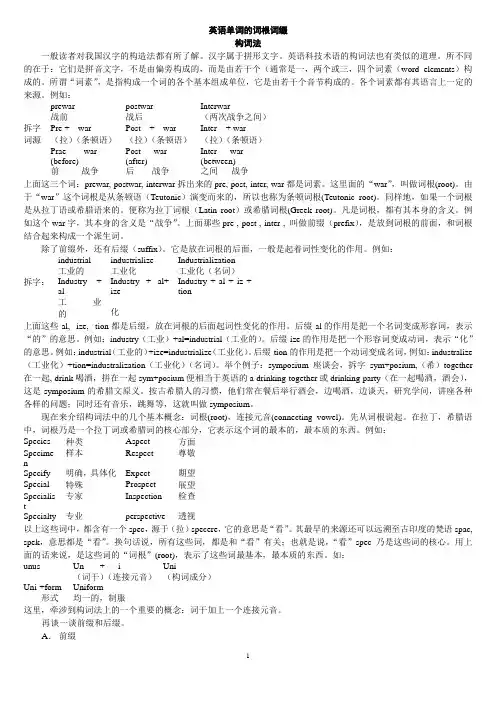
英语单词的词根词缀构词法一般读者对我国汉字的构造法都有所了解。
汉字属于拼形文字。
英语科技术语的构词法也有类似的道理。
所不同的在于:它们是拼音文字,不是由偏旁构成的,而是由若干个(通常是一,两个或三,四个词素(word elements)构成的。
所谓“词素”,是指构成一个词的各个基本组成单位,它是由若干个音节构成的。
各个词素都有其语言上一定的来源。
例如:prewar postwar Interwar战前战后(两次战争之间)拆字Pre + war Post + war Inter + war词源(拉)(条顿语)(拉)(条顿语)(拉)(条顿语)Prae war Post war Inter war(before) (after) (between)前战争后战争之间战争上面这三个词:prewar, postwar, interwar拆出来的pre, post, inter, war都是词素。
这里面的“war”,叫做词根(root)。
由于“war”这个词根是从条顿语(Teutonic)演变而来的,所以也称为条顿词根(Teutonic root)。
同样地,如果一个词根是从拉丁语或希腊语来的。
便称为拉丁词根(Latin root)或希腊词根(Greek root)。
凡是词根,都有其本身的含义。
例如这个war字,其本身的含义是“战争”。
上面那些pre-, post-, inter-, 叫做前缀(prefix),是放到词根的前面,和词根结合起来构成一个派生词。
除了前缀外,还有后缀(suffix)。
它是放在词根的后面,一般是起着词性变化的作用。
例如:industrial industrialize Industrialization工业的工业化工业化(名词)拆字:Industry +al Industry + al+izeIndustry + al + iz +tion工业的化上面这些-al, -ize, -tion都是后缀,放在词根的后面起词性变化的作用。
英语字根1.ag=do,act 做,动2.agri=field 田地,农田(agri也做agro,agr)3.ann=year年4.audi=hear听5.bell=war战争6.brev=short短7.ced,ceed,cess=go行走8.cept=take拿取9.cid,cis=cut,kill切,杀10.circ=ring环,圈11.claim,clam=cry,shout喊叫12.clar=clear清楚,明白13.clud=close,shut关闭14.cogn=known知道15.cord=heart心16.corpor=body体17.cred=believe,trust相信,信任18.cruc=cross 十字19.cur=care关心20.cur,curs,cour,cours=run跑21.dent=tooth牙齿22.di=day 日23.dict=say说24.dit=give给25.don=give给26.du=tow二27.duc,duct=lead引导28.ed=eat吃29.equ=equal等,均,平30.ev=age年龄,寿命,时代,时期31.fact=do,make做,作32.fer=bring,carry带拿33.flor=flower花34.flu=flow流35.fus=pour灌,流,倾泄36.grad=step,go,grade步,走,级37.gram=write,draw写,画,文字,图形38.graph=write,records写,画,记录器,图形39.gress=go,walk 行走40.habit=dwell居住41.hibit=hold拿,持42.hospit=guest客人43.idio=peculiar,own,private,proper特殊的,个人的,专有的44.insul=island岛45.it=go行走46.ject=throw投掷47.juven=young年轻,年少48.lectchoose,gather选,收49.lev=raise举,升50.liber=free自由51.lingu=language语言52.liter=letter文字,字母53.loc=place地方54.log=speak言,说55.loqu=speak言,说56.lun=moon月亮57.man=dwell,stay居住,停留58.manu=hand手59.mar=sea海60.medi=middle中间61.memor=memory记忆62.merg=dip,sink 沉,没63.migr=remove,move迁移it=soldier兵65.mini=small,little小66.mir=wonder惊奇67.miss=send 投,送,发(miss也作mit)68.mob=move动69.mort=death死70.mot=move移动,动71.nomin=name名72.nov=new新73.numer=number 数74.onym=name 名75.oper=work工作76.ori=rise升起77.paci=peace和平,平静78.pel=push,drive推,逐,驱79.pend,pens=hang悬挂/weigh称量/pay支出,付钱,花费80.pet=seek追求81.phon=sound声音82.pict=paint画,描绘83.plen=full满,全84.plic=fold折,重叠85.pon=put放置86.popul=people人民87.port=carry拿,带,运88.pos=put放置89.preci=price价值90.punct=point,prick点,刺91.pur=pure清,纯,净92.rect=right,straight正,直93.rupt=break破94.sal=salt盐95.scend,scens=climb爬,攀96.sci=know知97.sec,sequ=follow跟随98.sect=cut切割99.sent,sens=feel感觉100.sid=sit坐101.sist=stand站立102.son=sound声音103.spect=look看104.spir=breathe呼吸105.tail=cut切割106.tain,ten,tin=hold握,持,守107.tect=cover掩盖108.tele=far远109.tempor=time时110.tend(tens,tent)=stretch伸111.terr=land,earth土地,陆地112.text=weave纺织113.tract=draw拉,抽,引114.un=one一115.urb=city城市116.vac,vacu=empty空117.vad,vas=walk,go行走118.vari=change变化119.ven=come来120.vert,vers=turn转121.vi,via=way道路122.vis,vid=see看123.vit=life生命124.viv=live活超实用——终于有人把英语单词常见前缀后缀整理齐全啦!前缀1 a- 加在单词或词根前面, 表示不,无,非2 a- 加在单词前, 表示在..., ...的3 ab-, abs- 加在词根前,表示相反,变坏,离去等4 ab-, ac-, ad-, af-, ag-, an-, ap-, ar-, as-, at- 等加在同辅音字母词根前,表示一再等加强意5 ad- 加在单词或词根前, 表示做....., 加强......6 amphi- 表示两个、两种7 an- 在词根前, 表示不,无8 ana- 表示错误,在旁边,分开9 ante- 表示前面,先10 anti- 表示反对,相反11 apo- 表示离开,远离12 auto- 表示自动、自已13 be- 构成动词,表示使......成为14 be- 构成一些介词15 bene- 表示善, 好16 bi- 表示二个, 两17 by- 表示在旁边,副的18 cata- 表示向下,相反,离开19 circum- 表示环绕,周围20 co- 表示共同,通常放元音词根前21 col-, cor- 在同辅音词根前, 表示共同22 com-, con- 表示共同23 contra - 表示反对,相反24 counter - 表示反对,相反25 de- 表示去掉,变坏,离开,变慢,向下等26 de- 表示使....成为,加强等27 deca- 表示十28 deci- 表示十分之一29 demi- 表示半30 di- 表示二个,双31 di- 表示使...变成,分开,离开32 dia- 表示穿过,二者之间33 dif- 和辅音重复表示不,否定,分开34 dis- 表示不,消失掉35 dis- 表示分开,分离36 dys- 表示坏,不良37 e-, ef- 表示出,出来,38 em-, en-, 表示进入... 之中,包围39 em-,en-, 表示使..... 进入状态40 endo- 表示内部41 epi- 表示在...上,在...周围,在...后面42 eu- 表示好,优秀43 ex- 表示出,出去44 ex- 表示前面的,前任的45 exo- 表示外部的,外面46 extra- 表示以外的,超过的47 fore- 表示前面,预先48 hecto- 表示百,许多49 hemi- 表示半50 hepta- 表示七51 hetero- 表示异类,异种52 hexa- 表示六53 holo- 表示全部'54 homo- 表示同类的55 hyper- 表示超过,太多56 hypo- 表示下面,次等57 il-, ir- 辅音重复表示不,无58 il-,ir- 表示使.....成为,进入59 im-, in- 表示不,无,非60 im-,in- 表示向内,进入61 inter- 表示在..... 之间,相互62 intra- 表示在内,内部63 intro- 表示向内,入内64 iso- 表示等, 同65 kilo- 表示一千66 macro- 表示宏传,大67 mal-; male 表示坏,恶68 meta- 表示超过, 改变69 micro- 表示微,小70 milli- 表示千,千分之一71 mini- 表示小72 mis- 表示错误,坏73 mono- 表示单个,一个74 multi- 表示多,很多75 neo- 表示新的76 non- 表示不,非77 ob- 表示逆,倒,加强意义78 octa- 表示八; 亦作octo79 omni- 表示全部,到处80 out- 示超过,过度81 out- 表示出去,过时82 over- 表示过度,过份83 over- 表示翻转84 over- 表示在... 之上85 paleo- 表示古,旧86 pan- 表示广泛的87 para- 表示半,类似,辅助88 para- 表示旁边89 para- 表示降落伞90 pen- 表示近似,差不多91 penta- 表示五92 per- 表示贯穿,自始至终93 per- 表示假,坏94 peri- 表示周围,靠近95 poly- 表示多奇速英语微信公众号qisuen96 post- 表示在后面97 post- 表示邮件,邮政98 pre- 表示 ...前的,预先99 pro- 表示赞同,亲...100 pro- 表示向前,在前101 pro- 表示很多...102 proto- 表示原始...103 pseudo- 表示假,伪104 quadri-,quadru- 表示四105 quasi- 表示类似,准106 re- 表示向后,相反107 re- 表示一再,重新108 retro- 表示向后,倒退109 se- 表示分开,离开,区别开110 semi- 表示半111 sept-,septi- 表示七112 sex-, sexi- 表示六113 step- 表示后,继或前夫(妻)所生114 stereo- 表示立体115 sub- 表示在下面,次一等,副手116 sub- 表示接近,靠近117 suc-, suf-, sup-, sur- 等辅音重复表示在...下面118 super- 表示在...上面119 super- 表示超级,超过,过度120 supra- 表示超...121 sur- 辅音不重复表示超过,在上面122 sus- 表示在... 下面123 sym-, syn- 表示共同,相同124 tetra- 表示四125 trans- 表示横过,越过126 trans- 表示变换,改变';转移127 tri- 表示三128 twi- 表示二、两129 ultra- 表示极端130 ultra- 表示超出,超过131 un- 表示不,无,非,没有132 un- 表示打开,解开,弄出133 under- 表示在...下,在...之内134 under- 表示不足,不够135 under- 表示副手3136 uni- 表示一个、单一137 vice- 表示副138 with- 表示向后,相反后缀139 -ability 表名词,能...;性质140 -able 表形容词,可...的,能...141 -ably 表副词,能...地142 -aceous 表形容词,具有...特征的143 -acious 表形容词,有特征的,多...的144 -acity 表名词,有...倾向145 -acle 表名词, ... 物品,状态146 -acy 表名词, ...性质,状态147 -ad 表名词, ...东西,状态148 -ade 表名词, 表示状态,物品149 -ade 表示个人或集体150 -age 表示:费用151 -age 表示场所,物品152 -age 名词后缀,表示状态,总称153 -ain 表名词, ...人154 -air 表名词,人、物155 -aire 表名词, ...人156 -al 表形容词, ...的157 -al 表名词,人,物,状态158 -ality 表名词,状态,性质159 -ally 表副词,由al+ly 构成, ...地160 -an 表名词和形容词, ...地方,...人161 -ance 表名词,性质,状况162 -aneity 表名词,表示性质,状态163 -aneous 表形容词, ...有; ...特征的164 -ant 表形容词, ...的165 -ant 表名词, ...人166 -ant 表名词, ...剂167 -ar 表形容词, ...的168 -ard 表名词,不好的人169 -arian, 表形容词或名词, ...的(人)170 -arium 表名词,地点,场所171 -ary 表名词,人,场所,物172 -ary 表形容词, ...的173 -ast 表名词, ...人,物174 -aster 表名词,不怎么样的人175 -ate 表动词,做,造成176 -ate 表形容词,具有...的177 -ate 表名词,人或地位178 -atic 表形容词,有...性质的179 -ation 表名词,行为,过程,结果180 -ative 表形容词,有...倾向(性质)的181 -ator 表名词,通常由ate结尾的动词而来,做事的人或物182 -atory 表名词场所,地点183 -atory 表形容词,有...性质的184 -cy 表名词,也作-acy, 性质,状态185 -dom 表名词,状态或领域186 -ee 表名词,被动或主动的人187 -eer 表名词, ... 人员188 -el 表名词,人或物189 -en 表动词,变成190 -en 表形容词,由...制成的,通常加在名词后面191 -en 表名词,人或物192 -ence 表名词,性质,状态193 -ency 表名词,ence 的变体194 -enne 表名词,女性195 -ent 表形容词, ...的196 -ent 表名词, ...药剂197 -ent 表名词, ...人198 -eous 表形容词,有...的199 -er 表动词,反复做200 -er 表名词,物品,机器201 -er 表名词, ...人202 -ern 表形容词, ...方向的203 -ern 表名词, ...场所204 -ery 表名词,场所,地点205 -ery 表名词,行为,情况206 -esque 表形容词,如...的207 -ess 表名词,女性,雌性208 -et 表名词,小东西209 -etic 表形容词,属于...的210 -ette 表名词,小的东西或状态211 -ety 表名词,状态212 -eur 表名词, ...人213 -faction 表名词,达到的状态,由-fy转化而来214 -fic 表形容词,产生...的215 -fication 表名词,由fic变化而来216 -fier 表名词,人或物,由-ify转化而来217 -fold 表形容词或副词,倍,双重218 -form 表形容词,有...形状的219 -ful 表形容词, 有...的220 -ful 表名词, 满,量221 -fy 表动词, ...化,成为... ,更多时候作-ify 222 -hood 表名词, 时期,性质等223 -ia 表名词, 某种病224 -ia 表名词, 总称,状态225 -ial 表形容词,有...的226 -ian 表名词,某种人227 -ian 表形容词, ...国家的228 -ibility 表名词,具备...性质的229 -ible 形容词能...的230 -ic 表形容词, ....的,有时作-tic231 -ic 表名词,某种药232 -ic 表名词,人或学科233 -ical 表形容词, ...的234 -ice 表名词,行为,状态235 -ics 表名词,学科,学术236 -id 表形容词,如...的237 -ie 表名词,小东西或人238 -ier 表名词,人或物239 -ile 表形容词, ...的240 -ile 表名词,物体241 -ine 表形容词, ...的242 -ine 表名词,人或女人243 -ine 表名词,状态, 药物等244 -ing 表形容词,正...的,令人...的245 -ing 表名词,行业246 -ing 表名词,物品247 -ing 表名词,状态248 -ion 表名词,动作或状态分为--sion和--tion两种249 -ion 表示某种物,用品250 -ior 表形容词,较...的251 -ious 表形容词, ....的252 -ise 表动词后缀,和-ize 相同,是-ize 的变体, ...化253 -ise 表名词,物品,状态254 -ish 表形容词,象...一样,有的... ,通常放在一具体名词后255 -ish 表动词,造成...256 -ish 表示国家的或语言257 -ism 表示学术或学术流派258 -ism 表示行为, 现象,状态259 -ism 表示疾病260 -ism 表示具备某种性质261 -ism 名词,表示各种主义,宗教262 -ist 表名词,表示信仰者,专家或从事人263 -ist 以-ist 结尾的单词,不少同时可做名词和形容词用。
(a)esthet,(a)esthes=feeling ac,acr=sharpacerb=bitter,harshacid, acri, acrid, acu=sour, sharp aer, aero, 表示”空气,充气”等ag,act,ig=to do , to driveag/ig/act=driveagit=activeagog=leadagon=struggleagri, agro,表示”田地,农业”等al=nourishalb = whitealg=painalit,alesc,esc,olesc=grow,increase alt〔haut〕=highalter,ali,all,ulter,altru=otheram, amor, amat〔em,im,m〕=love ambul=walkampl = largeanci,antiq=oldanct=holyandro=male,mananim=life,spirit,mind,breath ann, enn=yearanthrop=man,humananti-=beforeapt,ept,att=fitaqu=waterarbit(r)=judgearc(h)=bowarch=ruler, rule, chief,arm=weaponart=skill, joint, trickastro,aster=staratitut,stit=set up ,placeaudi,audit〔ed,eis〕=hearaug ,auct,aux=increaseauto=selfav,avar, avi=desire;birdax=axisbal,bol,bl=throwbalm=balsam,表示"香油"ban=prohibit,control bar=weight;barbas=lower,bottombat〔bet,bit〕=gobat=beat,strikebell,bel=beautifull;war, fightbene/beni=goodbib,bev=drinkbiblio=bookbil=strongbio,bi=lifebirg表示”战斗,打”blanc=whitebond=bindbrace=two armsbraid = twist,表示"扭"brev, bridg=shortbu=oxbull=boil,sealburs=bag,sack,pursebys=end,bottomcad, cas, cid=fallcalc,culc=treadcalc=stonecalcul=reckon,表示"计算"calori=heatcamp = fieldcand=white,glowcant,cent〔chant,chans〕=sing,song cap, capt, cept ,ceive, cip, cup=take, hold, seizecap, cipit=headcar,char=dearCard chart=papercard, cord=heartcarn=fleshcast〔cest,chast〕=purecau=take carecaust,caut=burncav=holecaval,chival=horsecd=eatced, ceed, cess,ceas=gocel,celer=quick,speed,swiftcel〔ceal,cul〕,cover/cur=hidecel=sky,heavencens=assesscent=hundredcentr=centercept=takecern, cert, cret=sure, separatecerpt=pick,pluckchal=warm,ardentchar=carechor=sing,dancechron=timecid,cis,cas,chis=cut,killcil=callcili=eyelidcinct=bind,girdciner=ashescirc=ringcit=call,arouseciv=citizenclaim,clam=cry,shoutclar,clair=clearclav=keyclim=ladder,slopeclin,cli=bendcliv=bendclud,clus〔clos,clois,claus,clot〕=close coc,coct= cookcogn=knowcol,cul=neck,filter,till,large intestine,gluecoloss,colis=greatcom=banquet,revel,hair,sleepcomit=accompanycond =hidecontra-=againstcor,cord〔cour〕=heartcorn=horn表示"角"corp(or)=bodycosm(o)表示”世界,宇宙”cosnt=worldcost=rib,sidecover/cur=hidecracy,crat=rule,govern,government crastin=tomorrow cre,creas=grow,makecre,cru=grow,increasecreed,cred,cre=believe,trustcrep=to rattlecret,cern〔creet,cre〕=observe,separate crimin=crime,guilty,separatecrit,cris = judge,discerncroc〔croach,crouch,crotch,crutch,crook〕=hook,to bendcruc,crus,cruis,crux=crosscrypt=secret,hiddencub,cumb=lie,lean,downculp=fault,to blamecult=till,表示”耕种,培养”cumber=barriercumul=pile,heapcur,curs〔cor,cour,cours,coars〕=run cur=take carecuse=causecuss = strike,shakecustom= habitcwns= judgecycl(o)表示”圈,环,轮”cyn=dogdamn,demn,dam=curse,harmdem(o)=peopledemn=harmdens=make thickdent=toothderm,dermat =skindexter = rightdextr=right handdi=daydict,dic=say,assert, declaredig=need,lackdign〔dain,deign〕=worthy,nobledit=givedoc,doct=to teachdol=grievedom=housedomin=master,lorddomit=tamedon,dot〔dow,dos〕dat〔dit〕=give dorm=sleepdox=opiniondraw=pulldrom=rundu,dub,doub=two,uncertainduc,duct〔du〕=leaddulg=yielddur=last,harddyn,dynam=powereco,ecu,oce=houseed,es=eatego=I,meegyr=bring togetherehrom=colorem,empt,ampl,eem,mpt,m,ansom=take emper,imper=commandequ,equi〔iqu〕=equalerg=energy,workerr〔arr〕=wander,mistakeev=age,timeextr(e),exter=outfa,fam,fess=say,speak,talkfa/fam/fess=say,declarefabl,fabul=speakfabric=makefac,fact,fec,fect,fic,fict,fig〔feas,feit,feat,fit〕=make,dofac,fic=facefader=leaguefall,fail,fault=err,deceivefect表示”作用”feder表示”联盟”fend,fens=strkefer=bring,carry,bearferv=boilfest=feastfest=hostile,表示"仇恨"fet=productivefid〔fi,fy,feder,feal〕=trust,faithfig=formfil,fili=thread,son,foulfin=end,limitfirm=firm,strongfisc=chest,money basketfix=fix flam,flagr=blaze,burnflat=blowflect,flex=bendflict=strikeflig=driveflor,flour=flowerflu=flowfoli=leaffore,fort,forc=storngform=shape,formformid=fearfound,fund=basefract,frag,fra,frang,fring=breakfranc=loosen,freefrig,friger=coldfront=forehead,facefug=fleefulg=shinefum=smokefunct=performfurt=luckfus,fut,fund,found=pourfusc=darkfut=flow,pourfute=beatgam=marriagegar,garn=furnishgen(gn),gener,genit=birth,produce,race, kind,creationgeo表示”土地”ger,gest,gist=carry,beargerm=seedgest,gister=carry,bringglob=spheregloss,glot=tonguegno,gn,n,gnost,gnor=knowgon=angle,compare,testgrad,gred,gress=step,grade,gogran,grain=grain,seedgrand=great,largegraph,gram=writegrat,grac,gree=pleasing,thankful grav,griev=heavygreg=group,flock,mobgress=.go,walkgross,groc=large,thickgyn,gynec=womanhab,hib=live,have,holdhabit=dwell,表示”居住”hal,halit=breathehap=chancehau=possesshaust=draw waterhelic=spiral,表示"螺旋"helio=sunhemer=dayher,hes=stickher=heirhibit=holdhier=holyhilar=glad,merryhod,od=way,roadhom=manhomo表示”相同”hor=shudder,bound,hourhort=encourage,urgehospit,host=guesthum=earth,groundhydy,hydro= waterhypno=sleephypo=underidea,ideo=ideaident=the sameidio=peculiar,own,private,proper idol=imageign=fireimag,imit=imagine,lkeness,mimic insul,isol=isandinter,integr=wholeit〔i〕=goject,jac〔jet〕=throw,castjoc=jokejourn=dayjudg,judic=judgejug=yoke,表示"牛轭"junct,join,jug=join,bindjur,juris=swear,lawjust=right juven=younglabor=labor,worklact=milklangu=faint,表示"虚弱"lapid=stonelaps=slip,表示”滑,滑走”lat= carry,bearlater=sidelav,lau,lu=washlax=looselect, leg〔li, lig, leag, ly〕= speak, read, choose, gather,law,sendlect,lig〔let,lic〕= choose,gather,entice leg,legis=lawlen=softlet,liv=limeleth=deathlev,liev=raise,lighten,smoothlex,lexic=word,speechliber/liver=freelic=allure,entice,permit,表示"引诱" licen=allowlidr=booklimin,lim=thresholdlin,lign=linelingu=languagelinqu〔lic,lict〕=leavelip = leaveliqu=wetliter=letterlith=stoneloc=placelocut/loqu=say,declarelog,logu=speaklog=scienceloqu,locu=speaklot=lotluc,lust,lux=light,shineluct=strugglelud,lus=play,laughlumin,lun=lightlun=moonlustr=lightlute=washlys,lys,lytt=breakmach,mech=machinemacul=stain,spotmagn=greatmaj=greatman, manu= handman,main〔mn〕=stay,flow mand,mend=ordermarin,mar=sea,warmark= signmat=ripemater, matr,metro= mother mea,ma=passmed=heal,attend tomedi=middlemedit=measuremega表示”大”mell,mel〔mil,mol,mar〕=honey memor=memorymen〔mean〕=leadmend=free from faultmens=measurement= mindmerc,merch=trademerg, mers= sink,dip,plunge merit=deserve,earnmeter,metr,meas,mens==measure meur=mene,表示"神经"migr=removemilit=soldier,fightmim=imitatemin,men=project,hangmini,min=smallmir =wonder,lookmisc=mixmiser= pity,wretchedmiso = hatemiss,mit〔mis,mess〕= send,cast mnes,mnem,mem(or)=remember mob,mot,mov=movemod=fit,mode,mannermol=grind,grain,burden,heap moll=softmon, min,monit= warn monstr=showmont,mount=ascend,hill,risemor=moralmord,mors=bitemorph=form,shapemort,mors,mor=deathmun=duty,function,gift,service muni,mun= publicmur=wallmus=muse,"缪斯"女神,有"娱乐"之意mut= changenarc=munbness,stupornat,nasc〔naiss,naiv〕=to be born naut表示”水手,航行家”nav,naus,naut= ship, naut引申为海员nect,nex= bind, 表示”连结”neg=denynegr, nigr= blacknihil=nothingnoc〔nox,nic,nec〕= hurt, poison, noct,nox=nightnomin,nomen=namenomy=a field of knowledgenorm=rule, standard,表示”规则,规范”nost = homenot=knownounc,nunci= speaknov=newnull=nonenumer=number,countnutrit,nutri=nourish,表示"营养"nym=nameod=songol,od=smellol表示”油”oner=load,burdenonym=name,wordoper,op=work ,richopt,ept=fit, abilityopt,op,ophthalm= sightopt= chooseoptim=bextor=say,declareora,orat=mouthorbit=circleord,ordin,ordain=orderori,orig,ort= rise, ,arise,beginorn=embellish,decorate,表示”装饰”oss=boneot(o)=earoxy,ox=sharp,acidpac,peas=peacepaci=peacepact=fastened,agree,表示"紧的"page=leaflet表示”小页,传单”pall=palepalp=feel,touchpar〔pair ,oer, pir, peer〕= arrange, appear, produce,equalpar=bring forthpar=equalpar=get readyparl=say,declarepart,port=part, dividepass,pat,path= felling, sufferpass=pass through,step,stridepast表示”喂,食”pat=walkpath=feeling, suffering, illnesspati表示”忍受,忍耐”patri,pater=fatherpecc=sinpecu=moneyped〔pod,pus,peach,patch,fet〕=foot ped=child, educationpel,puls〔peal〕= drive, pushpen,pun,poen=penalty,punishpend, pens〔penc,pond〕= hang pend,pens, pond= weight, expendper=try out,riskpet〔pit,peat〕=seek,rush,strivepetr(o)表示”石”pha/phe/phu/phras=say,declarephag=eatphan,phen,fan=showphil,philo=lovephob,phobia=dislikephon=sound phor=bringphyt(o)=plantpi=holypict〔pig〕=paintpil=hairpisc = fishplac,plais=to please,peaceplaint=complain,表示"抱怨"plat= flatplaud,plaus〔plod,plos,plex〕=clap hands, strike 表示"鼓掌"ple,plen,plet, pli,ply=full, fillplic,pli,plex,plo,ple,ply=foldplor=cry,weepploy=use,invlve,表示"用,参与"plu=moreplumb=lead,表示"铅"point,punct= point,make sharppold=big noisepolic,polis, polit=state, citypon, pound= putpopul,publ=peopleporc=pigport=carryportion=sharepos, post,pon,pound=putpost,poster=behind,coming afterpot〔pow,poss〕=powerful,capable of pot=drinkpoten=powerfulpover,pauper=poorprag,pract=do,businessprais, preci,pris,pric,priz= value, price prec=praypred=plunderprehens, prehend〔pren,pregn,priev〕=take,catchpress= pressprim〔prem,prin,pri〕= first, chiefpris= take, seizepriv=single, alone,proach=nearprob, prov= test, try, examine, good, properprol=offspring,表示"后代,子孙" proper, propri = one’s ownproto-表示”原始”prox,prop=nearproxim=close,nearpto=fallpud=feel shamepugn=fight,punct,pung〔punc, pounc, poign, pon, point〕= point,prickpur,purg=pure, cleanput =thinkputr=rotten,表示"腐烂"quaint=knowquest,quir, quisit, quer〔quist〕= seek, searchquiet, qui= still, quiet,restquit= freerabor=strengthrad,ras〔raz〕=rub,scraperadic,radis= rootral=calculaterange=rank,表示”排列,顺序”rap,rapt,rav,rep=snatch,takeras, rad=scrape,表示”刮擦”rat=reckonrect,rig=stright, rightreg,reign=rulerend=giverept=creep,表示"聪"rid, ris= laughrig=water,hardrob=strong,strengthrod, ros= biterog=askroge=madrot= wheelrot=turnrud= crude, 表示”原始,粗野”rud=redrupt=breakrust,rur=country表示"农村"sacr,sanct,secr〔sacer,saint〕= holy, sacer, saint sacr=holysag=perceivesal〔sail,saul,sil,sul〕=leap,表示"跳" sal= salt,表示”盐”salv,sav=savesan, sanit= healthysanguin= bloodsat,set=enoughsati,satis,satur=enough,full of foodsatill=small dropsault=jumpscal=ladderscen=setscend, scens, scent,scan=climbsci=knowscis,scind=cutscrib,script=writescrut=examinesect,seg= cut, dividesecut,sequ〔su〕= followsed,sess,sid=sitsembl=same,equalsemin=seedsen=oldsens, sent =feelserr=saw,表示"锯子"sert=join, insert,put,placeserv=serve, keepset=fixsever=earnest,cut,serioussid=sitsight=visionsign=marksimil, simul, sembl =alike,samesinu=bend,curve,hollowsipate=throwsist= stand, 表示”站立”sit=food,grain,sitsoc=companion,”同伴”,引申为”社会”sog=knowsol = alone / single, whole / entire, sun, comfortsol=sunsolid,sold=firm,wholesolv,solu, solut=loosen,freesom=bodysomn=sleepson=soundsoph=wisesort=kindsover=super,overspeci=look, kindspect, spec〔spic,spi,spy〕= look, see sper=hopespers= strew,sprinkle,scatter”散开”spin=thorn,表示"刺"spir=breathe,a coilsplend=shinespond, spons〔spous〕=promise,answer st, sta, stat, stan, stant, stin,sist= stand stall=placestell=starstern,stren=rigidstigm=markstil=dropstill=to dropsting ,stinct,stimul,sti,stig=prick,bind stip=press togetherstirain,striet,string=tightenstitute=standstrain,strict,string,stress,strang=bind,tie, drawtightstrat=spread outstren=strengthstroph=turnstruct=buildsuad,suas,suav=persuade,advisesult=leap,表示"跳"sum,summ = add up, total, highest, sum /take, use,wastesum,sumpt = takesur=sure,certain表示"肯定"surg,surrect=risetac,tic=silenttach=nail 表示"钉子"tact,tag,tang,tig,ting = touchtail=cuttain,ten,〔tin〕= hold tamin=touchtane=timetard=slow,表示"慢"techn=skill,ability,表示"技术...tect,teg=cover,hidetegr=touchtele = fartemn,tempt=scorn,表示"藐视" temper,tempor =time,age,season temper=moderate,stretchtempt =trytend,tent,tens =stretchtenu =thintermin=limit,end,boundaryterr=eartth,to frightentest=test,witness,weavetext=weavethe(a)=godtherm=heatthesis, thet, thes, them, thec= setting, put, placetim〔tem〕=feartir=draw,表示"拉"tol(er)=endure,raise,supporttom〔tem〕= cuttort,tor = twisttouch=touchtour,torn,tourn =turntox= poison 表示"毒"tra,tract〔treat〕=drawtract =draw,表示"拉,拖"treat=handle,表示"处理"trem,trep=quiver,feartrench=cuttri,trit=rub,表示"磨擦"tribut=give,paytric,trig=petty obstacletrop=turntroph=nutrition 表示"营养"tru=truetrud ,trus=push,thrusttuine = twine,表示"编织"tum=swellturb=agitatetut,tuit=protecttyp=typeuls,ult=pluck,teorultim=endumbr=shade,shadowun,uni=oneund = waveup=up,overurb = cityus,ut = usevac,vacu=emptyvad,vas〔wad〕=walk,govag=wanderval,vail=worth,strongvan,vain=emptyvapor=steamvari=changevaric=straddleveh,vect,veigh,vex=carryveil=coverven,vent=comeveng=punish,表示"惩罚",引申为"报仇" vent=windver,verg,vers,vert=turnver,very=truever=fear,feel aweverb=wordvest=dressvestig=footprint,trackvet=oldvi,via,vey,voy =way,roadvibr=swingvict,vinc=win,conquer,showvid,vis=separate;seevil=cheap,base,表示"卑劣"vir=manviv,vit,vig,veg=life,livelyvmbr=shadow 表示"影子"voc,vok〔vouc,vow,voic〕=call,voice vod,otunt= wish,willvoid=emptyvol,volv,volu=roll,turn.vol=will,flyvor=eat vot=vow,表示"发誓" vulg〔mulg〕=people vuln,vult=woundward表示”奖赏”ware=watchwrin,ur=urine,表示"尿" zeal=ardor,表示"热心" zoo=animal。
人所共知,西方文化有两个源头:一为希腊(Hellenic)文化,一为希伯莱(Hebrew)文化,而希腊文化中的希腊神话(Greek mythology)对英语影响非常广泛。
表现在词汇方面就是英语吸收了部分词汇并将之沿用,而这些词又或是可分解词或是可溯源词。
这些词源包含的信息不仅可帮助读者准确理解每个词的词义,增添记忆单词的乐趣,还能特别记录、描述英语与古希腊文化的差异和交流,具有很高的历史性和趣味性。
由于罗马神话深受希腊神话的影响,故事情节与希腊神话大同小异,只不过人名不同,所以希腊神话时常和罗马神话联系在一起。
希腊罗马神话就像神话故事中的灵泉,滋养着英语的词汇,产生了许许多多美妙动人的词汇故事,增强了英语的生命力。
一源于希腊罗马神话中众神名字的英语词汇现代英语中,不少词汇来源于希腊罗马神话中众神的名字,至今仍起着重要的作用。
典型的词源试举如:1、Flora:古希腊罗马神话中的花神。
她嫁给了西风之神Zephyr,丈夫送给她一座满是奇花异草的园子。
春天时,Flora和丈夫Zephyr手挽手在园子里漫步,他们一路走过的地方百花齐放。
Flora在现代英语里指代“植物”。
衍生词:flower,flour,flourish,floral,florist。
2、Muses(缪斯):希腊神话中掌管艺术的诸神。
共九位,分别是历史、抒情诗、喜剧(牧歌、田园诗)、悲剧、歌舞、爱情诗、颂歌、天文、史诗。
Muses的艺术衍生出单词music,Muses收藏艺术品的地方就是museum。
艺术带来的快乐便是a-muse,amusement。
3、Pan(潘):牧神和森林之神,受打扰时会大声吼叫。
衍生词panic(惊慌,恐慌)。
4、Titan(泰坦):曾统治世界的巨人族的一员。
Titan在现代英语里指代高大强壮的人,重要人物。
衍生词titanic意指巨大的,极大的。
“泰坦尼克号”即以此命名。
5、Zephyrus(泽费罗斯):西风之神。
考研常见词根来历(词源)说明记单词有一种比较有效的方法是词根法,也有不少人采用,但失败的也占多数。
为什么?因为词根难记。
为什么词根难记,那是因为不知道词根是怎么来的。
本文档就为各位揭开各个词根的来历。
按字母顺序排列。
目录A (1)B (3)C (6)D (12)E (14)F (14)G (18)H (20)I (22)J (23)K (23)L (23)M (26)N (29)O (30)P (32)Q (36)R (36)S (38)T (44)U (49)V (50)G (53)Y (54)Z (54)A字母本意:㈠尖锐,角衍生词根Ang-尖锐的Arch拱、拱形㈡高衍生词Alps衍生词根Alt-高Alb-白㈢鸟,飞,航行aviation-航行aviary-鸟笼1.Ang-=anG=ac尖锐的来自本意㈠如:Angle尖角anGious焦急的acidacutea.剧烈的;敏锐的;成锐角的;尖的,高音的2.Alt-高来自本意㈡如Altitude3.Alb-白来自本意㈡和Alps阿尔卑斯如:Album相册4.alter衍生自other属于音变类如:alter变更,改变alternate交替,轮流,换班alternative两者交替的5.Arch拱、拱形来自本意㈠如:Architect建筑师6.ag--行动,作为衍生自act如:agent代理人agency代理机构actual活动的、现场的agony极大痛苦、创伤(劳作引起的痛苦)不能解释:Angel--天使8.Alco--有乙醇的意思来源不可考如:alcoho实际上是这样的:hol-疯狂、兴奋取自本意㈠和holiday如:alcohol含酒精的饮料9.apt-=at适合的来自appropiate恰当的、适合的如adapt适应,适合;改编attidtude态度。
看法(比如你今晚适合干什么,不是一种态度、看法吗?)10.aw-模仿人在感到糟糕的时候的语气声音"噢“如awful极坏的,威严的,可怕的10.1awk反来自于away(离开,背离)如:awkward笨拙的;尴尬的;(总是往反方向的)11.auG-aug=auth=aut=auct词根:增加、增多来源无可考,但可以根据奥古斯都来记如:auGiliary辅助的,补助的(辅助是将原有的东西变大的过程)autumn秋天(August八月八月不是秋天吗?)auction拍卖12.auto-自己来源无可考如:automatic13.audi-词根听来自earr化成d是因为r衔接后缀的能力不强如audio听觉14.arb=arbit-法律来自于Hammurabi汉谟拉比如:arbiter法官arbitrary武断的15.arith-arid贫瘠的,乏味的来源不可考如:arithmetic算术正因为手里的工具贫脊,所以才要构建算术体系撒16.alg=ally集合来源无可考如algebra代数学,代数(bra相当于break,破碎,把破碎的东西集合起来)17.al生长来自于ol如:coalitonn.结合体,同盟;结合,联合18.agri-土地来源于acre亩、田地和g的本意撒如:agricultrure19.apt-恰当、适合来自于appropriate的简写抽取前缀,词根和后缀如:adpatvt.使适应,使适合;改编;改写vi.适应20.ance-=anci=ante=anti这个词组我们最常见到的是后缀,但它还是个词根,来源不可考如:ancient古老的advance前进antenna(ante+ten延伸+a)天线anticipate 预料,期望21.①al-全部来源于:all如:alcohol酒精(al+co+hol)alert机警的,警觉的②al-外来源于alter→alt→other→out如alien外国人;外星人当然如果你在单词开头看到了两个ll那就不是词根而是加强语气的前缀了,如:allege22.ally集合来源于于词根loy捆绑即ally=(a+loy)如:alliance结盟rally再集合,重整,恢复23.am-词根爱用谐音“爱:去记吧!当然还有很多方法,如阿莫·丘比特(Amourcupid)等等具体参见考研8-119:10如:amateura./n.业余(水平)的(运动员、艺术家等),业余爱好者24amb-词根走宏观扩展于ambulance“战时走动医院”,救护车如:ambassador“大使”(ass是驴的词根)ambition野心25ass词根驴本身这个诩根也就是驴的单词26.ann一年来源无可考如:annuala.每年的,一年生的n.年刊;一年生植物anniversary-周年纪念17.ang=anG=anct急,怒宏观扩展于angerangry如:anGietyn.挂念,焦虑,焦急,忧虑;渴望,热望18.appar词根表现来自于appear如:apparent表面上的,貌似真实的;显然的,明明白白的19.astro前缀星星来源于:star的颠倒,并外加字母o,起衔接作用,如geo-土地。
现代英语单词的几个主要来源。
英语单词最为重要的来源就是希腊语和拉丁语;第三就是日尔曼语系的各种语言。
几乎所有这些词语都在罗马帝国分崩离析后的很长一段时间内加入英语的行列,直到现在还在加入。
尤其在科学领域,新词不断被发明出来,使用的依然是希腊语和拉丁语词根。
许多单词包含了一个以上的词根,一些词语混合了希腊语和拉丁语词根。
我们常用的词根只是现存词根的一部分,由它们产生了许多常见的单词。
这些词根都由每个希腊语和拉丁语单词的部分形成,一些词根的形式不止一种,说明它们在源语言中的形式有所改变,正如buy与bought是同一单词的不同形式。
了解希腊语和拉丁语词根的含义有助于记忆单词的词义,也能帮助我们在遇到新词时猜测词义。
知道一个词根的含义至少可以帮助我们猜测含有该词根单词的词义不至于差得太远。
除此之外,英语中的很多词语带有丰富的文化内涵,它们的一部分出自古希腊古罗马神话、圣经、文学名著;有一部分源自风俗、历史、政治、经济、商业、农业、天文、地理、航海、体育、艺术、动物、植物等等。
这些词语从原义产生了喻义、转义,有的原义和喻义、转义并存,有的已不使用原义。
举个单词源于词根的例子,我们知道,―水‖的英语单词是water,但是英语中有许多和―水‖有关的单词并不包含water,作为构词成分,water 有个对应的拉丁语词根aqua,例如aquamarine(宝蓝色的,海蓝色的),aquanaut(潜水员),aquarium(水族馆,养鱼池)等等都是和―水‖有关的单词。
此外,黄道十二星座中的水瓶座(或称宝瓶座)的英语单词Aquarius 也是源自aqua,Aquarius 的字面含义即为―担水的人‖。
我很喜欢的,也是我的小外甥女很喜欢的Aqua 乐队(中文译名―水叮当‖)直接用了拉丁文。
我对英语单词了解得越多就越发现它们与我们的汉字有不少神似之处。
好比说,汉字有独体字,如:人、口、手等等,相应的,英语单词也有不少―独体字‖:man,hand,year,etc.而且英语单词的―独体字‖还往往有对应的希腊语或拉丁语词根,与上面提到的这几个单词相对应的词根分别是anthrop(源自希腊语),chiro(源自希腊语),ann/enn(源自拉丁语)。
考研英语常见词根的来历(词源)目录本文的图例符号说明:1词根提示符 ._ 2词源提示符 __<et>,etymology[,etɪ'mɒlədʒɪ]3 希腊(G.), Greek[griːk], 4拉丁(L.) Latin['lætɪn] 5古英语(O.E.) Old English[əʊld]['ɪŋɡlɪʃ]6古法语(O.F.) Old French[fren(t)ʃ] (英语四大来源: 中古英语、拉丁语、希腊语、法语)A字母本意:㈠尖锐,角衍生词根 ang-尖锐的 arch[ɑːtʃ]拱、拱形㈡高衍生词 alps[ælps]衍生词根alt-高 alb-白㈡鸟,飞,航行 aviation[eɪvɪ'eɪʃ(ə)n]-航行 aviary['eɪvɪərɪ]-鸟笼1. 来自本意㈠ ang-=anx angere, anxi(l.), anxo(g.), to strangle['stræŋg(ə)l], choke[tʃəʊk], pain[peɪn]使窒息, 痛苦angle['æŋg(ə)l]尖角 anxious['æŋ(k)ʃəs]焦急的 angustation n. 狭窄注:词根anx表示急、怒‘可以通过联想法进行记忆:an(一)+x(联想成未知数x)——一个未知数x让我急又怒——anx(词根:急,怒)anxiety[æŋ'zaɪətɪ] n.焦急,忧虑,渴望;挂念;令人焦虑的事助记:anx(词根:急,怒)+i&e(音阶过渡字母)+ty(名词后缀)——因为焦急,所以渴望(得到帮助)——anxiety(焦急,忧虑,渴望)anxious['æŋ(k)ʃəs] adj.焦急的,担忧的,渴望的;急切的助记:anx(词根:急,怒)+i(音阶过渡字母)+ous(形容词后缀)——焦急的——因为焦急,所以渴望(得到帮助)——anxious(焦急的,担忧的,渴望的)anger['æŋgə] n 怒,愤怒vt. 使发怒,激怒;恼火vi. 发怒;恼火助记:ang(词根:急,怒)+er(后缀:多表示…人,…物)——anger(怒,愤怒)angry['æŋgrɪ] adj.愤怒的,生气的,狂暴的;(伤口等)发炎的助记:angr(来自于anger:愤怒)+y(形容词、名词后缀)——angry(愤怒的,生气的)短语:be angry with[wɪð] sb.生某人的气;be angry at[æt; ət] sth.因某事而生气ac尖锐的来自本意㈠如:acid['æsɪd] n. 酸;<俚>迷幻药 a. 酸的;讽刺的;刻薄的acute[ə'kjuːt] adj. 剧烈的;敏锐的;成锐角的;尖的,高音的2. alt-高来自本意㈡注:词根alt为什么表示高呢?因为a的形状就像一座山峰Altai['æltai] n.阿尔泰山助记:来自于alt(词根:高)Alps[ælps] n.阿尔卑斯山助记:来自于alt(词根:高)altitude['æltɪtjuːd] n.高度,海拔,高地助记:alt(词根:高)+i(音阶过渡字母)+tude(名词后缀)——altitude(高度,海拔)3. alb-白来自本意㈡和alps阿尔卑斯如: album['ælbəm]相册4. alter 衍生自 other['ʌðə]属于音变类如:alter['ɔːltə; 'ɒl-] vi./vt.变更,改变alternate['ɔːltəneɪt; 'ɒl-] n. 替换物 adj. 交替的;轮流的vt. 使交替;使轮流vi. 交替;轮流alternative[ɔːl'tɜːnətɪv; ɒl-] n. 二中择一;供替代的选择adj. 供选择的;选择性的;两者交替的5. arch[ɑːtʃ]拱、拱形来自本意㈠arc[ɑːk] n.弧形,弓形,拱形助记:ar(来自于are:是)+c——是字母c的形状——弧形,弓形,拱形arch[ɑːtʃ] n.拱门,弓形结构,拱形 v.(使)弯成弓形助记:arch(ch-c, 来自于arc:弧形,弓形,拱形)——arch(拱门,拱形)architect['ɑːkɪtekt] n.建筑师助记:arch(拱门,拱形)+i(音阶过渡字母)+tect(词根:覆盖cover)——建筑师用拱形来覆盖地面——architect (建筑师)architecture['ɑːkɪtektʃə] n.建筑,建筑学助记:architect(建筑师)+ure(名词后缀)——建筑师的东西——architecture(建筑,建筑学)6. ag--行动,作为衍生自 act如:agent['eɪdʒ(ə)nt] n. 代理人,代理商;药剂;特工adj. 代理的vt. 由…作中介;由…代理agency['eɪdʒ(ə)nsɪ]n. 代理,中介;代理处,经销处,代理机构actual['æktʃʊəl; -tjʊəl]adj. 真实的,实际的;现行的,目前的;活动的,现场的agony['ægənɪ] n. 苦恼;临死的挣扎;极大痛苦、创伤(劳作引起的痛苦)不能解释:Ange l ['eɪndʒ(ə)l] n. 天使;守护神;善人vt. 出钱支持7. act[ækt] v.行动,做事,表演,扮演n.法令,条例短语:act as[æz; əz]作为…而演——充当,担任;act out[aʊt]行动出来,表演出来——表演,用动作表达action['ækʃ(ə)n] n.行动,表演助记:act(行动,表演)+ion(名词后缀)——action(行为,表演)短语:take[teɪk] action 采取行动; in action 在活动,在战斗中;out of[ɒv; (ə)v] action 失去作用,失去战斗力active['æktɪv] adj. 积极的,活动的,主动的助记:act(行动,表演)+ive(形容词、名词后缀)——行动起来的——active(积极的,活动的,主动的) activity[æk'tɪvɪtɪ] n.活动;行动助记:active(积极的,活动的,主动的)+ity(名词后缀)——activity(活动)actor['æktə] n.男演员助记:act(行动,表演)+or(后缀:多表示…人,…物)——actor(男演员)actress['æktrɪs] n. 女演员助记:actr(来自于actor:男演员)+ess(名词后缀:与阴性相关)——actress(女演员)actual['æktʃʊəl; -tjʊəl] adj.实际的,现实的助记:act(行动,表演)+u(音阶过渡字母)+al(名词、形容词后缀)——行动而非空谈的——actual(实际的,现的)exact[ɪg'zækt; eg-] adj.精确的,准确的助记:ex(前缀:…外…出out)+act(行动,表演)——从行动中得出的(而非道听途说的)——exactly adv.精确地,准确地助记:exact(精确的,准确的)+ly(形容词、副词后缀)——exactly(精确地,准确地)react[rɪ'ækt] v.起作用,起反作用助记:1.re(前缀:再一次again)+act(行动,表演)——再次行动——起作用2.re(前缀:后,回back)+act(行动,表演)——向回行动——起反作用practise['præktɪs] v.练习,实践助记:pr(前缀:…前)+act(行动,表演)+ise(动词后缀)——行动、表演之前要练习(台上一分钟,台下十年功)——practice(练习,实践)practice['præktɪs] n.练习,实践助记:pr(前缀:…前)+act(行动,表演)+ice(后缀)——行动、表演之前要练习——practice(练习,实践) 短语:in practice 在实践中practical['præktɪk(ə)l] adj.实际的,实践的,实践的助记:practice(练习,实践)+al(名词、形容词后缀)——practical(实际的,实践的)8. alco--有乙醇的意思来源不可考如:alcohol['ælkəhɒl]含酒精的饮料实际上是这样的:hol-疯狂、兴奋取自本意㈠和holiday9. apt-=at 适合的来自appropriate[ə'prəʊprɪət]恰当的、适合的如adapt[ə'dæpt] vi. 适应vt. 使适应;改编attitude['ætɪtjuːd] n. 态度;看法;意见;姿势(比如你今晚适合干什么,不是一种态度、看法吗?)10.1 aw-模仿人在感到糟糕的时候的语气声音"噢“如awful['ɔːfʊl] adj.极坏的,威严的,可怕的,使人敬畏的10.2 awk 反来自于away[ə'weɪ] adv. 离开,背离如:awkward['ɔːkwəd] adj.笨拙的;尴尬的;棘手的;不合适的(总是往反方向的)11. aux-aug=auth=aut=auct词根:增加、增多来源无可考,但可以根据奥古斯都来记如:auxiliary [ɔːg'zɪlɪərɪ; ɒg-]adj.辅助的,补助的,附加的,副的(辅助是将原有的东西变大的过程),n. 助动词;辅助者,辅助物;附属机构autumn['ɔːtəm]n. 秋天;成熟期;渐衰期,凋落期adj. 秋天的,秋季的 (August八月八月不是秋天吗?)auction['ɔːkʃ(ə)n] n. 拍卖vt. 拍卖;竞卖12. auto-自己来源无可考如:automatic[ɔːtə'mætɪk] n. 自动机械;自动手枪adj. 自动的;无意识的;必然的13. audi-词根听来自ear[ɪə] r化成d是因为r衔接后缀的能力不强如audio['ɔːdɪəʊ] adj.听觉的,声音的;音频的 n.声音回路;音响;可听到的声音;声音信号14. arb=arbit-法律来自于Hammurabi [,hɑ:mu'rɑ:bi]汉谟拉比如:arbiter['ɑːbɪtə] n. [法] 法官;仲裁者;裁决人arbitrary['ɑːbɪt(rə)rɪ] adj. [数] 任意的;武断的;专制的15. arith-,arid- 贫瘠的,乏味的来源不可考如:arithmetic[ə'rɪθmətɪk] n.算术正因为手里的工具贫脊,所以才要构建算术体系撒16. alg=ally 集合来源无可考如algebra['ældʒɪbrə] n.代数学,代数(bra相当于break,破碎,把破碎的东西集合起来)17. al 生长来自于ol如:coalition[,kəʊə'lɪʃ(ə)n] n. 结合体,同盟;结合,联合18. agri-土地来源于acre['eɪkə] n. 土地,地产;英亩;田地和g的本意撒如:agriculture ['ægrɪkʌltʃə] n. 农业;农耕;农业生产;农艺,农学19. apt-恰当、适合来自于appropriate [ə'prəʊprɪət](adj. 适当的;恰当的;合适的vt. 占用,拨出)的简写抽取前缀,词根和后缀如:adapt [ə'dæpt] vt. 使适应,使适合;改编;改写 vi. 适应20. ance-=anci=ante=anti这个词组我们最常见到的是后缀,但它还是个词根,来源不可考词根anc, antancient['eɪnʃ(ə)nt] n. 古代人;老人adj. 古代的;古老的,过时的;年老的助记:anc(词根:先前)+i(音阶过渡字母)+ent(形容词后缀)——先前的——ancient(远古的,古老的) antenna[æn'tenə](ante+ten延伸+a) n.天线anticipate[æn'tɪsɪpeɪt] vt. 预期,期望;占先,抢先;提前使用ancestor n.祖先,祖宗助记:anc(词根:先前)+ces(来自于cess:走)+tor(后缀:多表示…人,…物)——先前走的人士祖先——ancestor(祖先,祖宗)advance ['ænsestə]n. 发展;前进;增长;预付款adj. 预先的;先行的vt. 提出;预付;使……前进;将……提前vi. 前进;进展;上涨助记:ad(前缀:to)+v+anc(词根:先前)+e(尾音字母)——向前——advance(前进)短语:in advance 在前面,预先;in advance of…在…前面,超过advanced[æd'vɑːnst] adj.先进的,高级的助记:advance(前进)+ed(形容词后缀)——advanced(先进的)advantage[əd'vɑːntɪdʒ] n.优势,优点,好处助记:ad(前缀:to) +v+ant(词根:先前)+age(名词后缀)——向前而不退后——优势——advantage(优势)短语:take advantage of..利用…,占…的便宜antique[æn'tiːk] n.古物,古董助记:ant(词根:先前)+ique(等于ic:形容词、名词后缀)——先前的东西——antique(古物,古董)21. ①al- 全部来源于:all [ɔːl]如:alcohol 酒精['ælkəhɒl](al+co+hol)alert [ə'lɜːt] n. 警戒,警惕;警报adj. 警惕的,警觉的;留心的vt. 警告;使警觉,使意识到②al- 外来源于 alter→alt→other→out如 alien['eɪlɪən] n. 外国人,外侨;外星人adj. 外国的;相异的,性质不同的;不相容的vt. 让渡,转让当然如果你在单词开头看到了两个ll那就不是词根而是加强语气的前缀了,如:allege22. ally 集合来源于于词根loy 捆绑即ally=(a+loy)如:alliance[ə'laɪəns] n.结盟,联合;联姻rally['rælɪ]n. 集会;回复;公路赛车会vt. 团结;集合;恢复健康、力量等vi. 团结;重整;恢复;(网球等)连续对打23. am-词根爱用谐音“爱:去记吧!当然还有很多方法,如阿莫·丘比特(Amour cupid)等等具体参见考研8-1 19:10如:amateur ['æmətə; -tʃə; -tjʊə; ,æmə'tɜː] n. 业余(水平)的(运动员、艺术家等),业余爱好者;外行adj. 业余的;外行的24. amb- 词根走宏观扩展于ambulance ['æmbjʊl(ə)ns] n. “战时走动医院”,救护车ambition [æm'bɪʃ(ə)n] n. 野心,雄心;抱负,志向vt. 追求;有…野心助记:amb(词根:走)+i(音阶过渡字母)+tion(名词后缀)——想遍布各地——ambition(雄心,野心)ambulance['æmbjʊl(ə)ns] n.救护车,“战时走动医院”助记:“俺不能死”ambiguous[æm'bɪgjʊəs] adj.不明确的,模棱两可的,模糊不清的,引起歧义的助记:amb(词根:走)+ig(前缀:否定)+u(音阶过渡字母)+ous(形容词后缀)——走不了的——ambiguous(不明确的,模棱两可的)ambassador [æm'bæsədə] n. 大使;代表;使节(ass是驴的词根)助记:amb(词根:走)+a(音阶过渡字母)+s(双写)+sad(a-I, d-t ,来自于sit:坐)+or(后缀:多表示…人,…物)——在国家间走走坐坐的人——ambassador(大使)联想:“俺办事的”embassy ['embəsɪ]n.大使馆;大使馆全体人员助记:大使(ambassador)在大使馆(embassy)25. ass 词根:驴本身这个词根也就是驴的单词(ass[æs]26. ann 一年来源无可考注:词根ann表示一年,可以通过联想法进行记忆:an(一)+n(联想拼音:年)——ann(词根:一年)annual['ænjʊəl] n.年刊,年鉴,一年生植物adj. 一年一次的,每年的,年度的助记:ann(词根:一年)+u(音阶过渡字母)+al(名词、形容词后缀)——annual(年刊,一年一次的)anniversary [ænɪ'vɜːs(ə)rɪ]n. 周年纪念助记:ann(词根:一年)+i(音阶过渡字母)+vers(词根:旋转)+a(音阶过渡字母)+ry(后缀)——一年转到一次的是周年纪念——anniversary(周年纪念)27. ang=anx=anct 急,怒宏观扩展于anger angry如:anxiety[æŋ'zaɪətɪ] n. 挂念,焦虑,焦急,忧虑;渴望,热望28. appar 词根表现来自于appear[ə'pɪə]vi. 出现;显得;似乎;出庭;登场如:apparent[ə'pær(ə)nt] adj.表面上的,貌似真实的;显然的,明明白白的29. astro前缀星星来源于:star 的颠倒,并外加字母o,起衔接作用,如geo-土地。
1,翻译“无边落木萧萧下,不尽长江滚滚来”hawkie:who can translate this: 无边落木萧萧下不尽长江滚滚来any volunteers?余光中说,这两句诗你把世界上最好的翻译叫来也不好翻译,为什么?“无边落木萧萧下”,萧萧是草字头,木翻出来,草字头翻不出来。
“不尽长江滚滚来”,长江的江是三点水,滚滚的滚又是三点水,也没有办法翻出来帝皇侠:这难度,只能到信的层次了,翻译成“树叶落着,江水流着”dfo:hoho 确实是这么回事Leaves are dropping down like the spray of a waterfall, While I watch the long river always rolling on. hawkie:翻译巨擘许渊冲老先生的译文:The boundless forest sheds its leaves shower by shower;The endless river rolls its waves hour after hour.无边boundless 不尽endless为了和shower押韵,加了hour after hour (加强了也可能是重复了endless的意思)2,词源和词根词缀的联系?怎样入手词根词缀才能接近词的本源?Ch:我有个比较愚的问题,词源和词根词缀有什么联系呢?William:词源是词的来历,词的历史;词根词缀是一个词的分解组合,一般它们都有来历Grace:你这个解释,真不妥当。
William:随手瞎写了,你来解释下。
Grace:我觉得他这个问题问得很好,也是我想问的,我等老师们来解答。
我加一个问题就是:到底怎么样入手词根词缀才能更加接近词的本源,因为袁老师推荐的词源入门的初级读物基本上都是词根词缀相关的书。
William:研究语言就怕把“历时”和“共时”混在一起说,混在一起说就乱了,让人理不清了。
词根和词缀很多时候,名和实与古代有很大的区别,若不做专门研究,对初期语言学习会造成混乱的。
聽海:词源就是一个词的源头,以及这个词的发展演变历史,还有他的亲戚子孙等等;词根词缀是演变的结果吧,更加接近应用层面。
这是我的一点理解。
William:前面说的对,更接近应用层面应该做当代语言使用的现状理解。
3,关于英语短语词源Jason:英语短语词源谁有,比如put out,如何理解为熄灭,take in 为什么是欺骗?Ch:这个问题好!英语短语如何有词源?Jason:face the music为什么是承担后果或面对不愉快的局面?有没有这样的书籍?William:idiomatic dictionary。
声擒单词:21世纪大英汉词典face the music:[美国口语]为错误行为承担后果,勇于承担后果,不躲避责任;倾听批评(或责备)(借喻演员首次演出时克服紧张情绪)。
晓柯:音乐声响起的时候,演员就该上台了,很紧张的关系吧。
take in应该是将某人引入事先设计好的圈套中。
Q4C:face the music 看来源头意义上很像stage fright。
4,提问辅音的演变由来及丁老师的推荐Q4C:哪位同志做个英语现在的辅音的演变由来?比如th的发音来自pgmc那个像b(那个符号不会打)的发音。
丁朝阳:这本书可能对你有帮助:Indo-European Language and Culture: An Introduction provides a comprehensive overview of comparative Indo-European linguistics and the branches of the Indo-European language family, covering both linguistic and cultural material.5,推荐袁老师的采访链接be myself:袁老师的采访链接~~ /new/p397523/6,提问英语地名,人名语源词典及丁老师的推荐Jason:谁有英语地名,人名语源词典丁朝阳:有一本《环球地名初探》by 刘伉,877页,很厚;/7,提问*aus- 是如何发生的音变?声擒单词:eos “黎明女神”(每天为太阳神掀开东边天门,让他驾太阳车进来);因此,eos 词源*aus-的含义是太阳从东方发出的光普照大地——“照耀”,所以同源词有:east 东方;向东方。
Easter [宗]复活节[east+-er(后缀)](复活节是春分月圆后的第一个星期日,取其阳光明媚的含义)请教:*aus- 是如何发生的音变?8,关于destinationJason:destination:de-离开,st站,立,in进入,引申为到达,-ion 名词后缀-----离开原地而要去的地方-----目的地。
这样解释对么?宝:in貌似解过头了Jason:de-完全,stin站,-ation名词复合后缀→完全要站立的地方→坚定的的目标→9,关于acrobat2014 32°42′56°54′:bas-, baso-, basi-, ba-, bat-(Greek > Latin: stepping, to step, to go, to walk; a place where someonesteps; a pedestal; a foot for stepping; foundation, ground, base)还是词典好张晓东:最好是用袁老师,丁朝阳老师和稻草人的分享的文件。
其他的文件要甄别。
2014 32°42′56°54′:不要偷懒,一个个字典查进步才快,不然容易迷失啊安睡美:acrobat杂技演员不是么465908795:acro(sharp,high,point)+bat(walk) 走在高处的人。
安睡美:bat不是蝙蝠的意思么?随便一联想就不成杂技演员了么帝皇侠:朗文现代英语词典里都有465908795:和acrophobia 恐高症同源安睡美:bat到walk音变吧465908795:bat 表示蝙蝠是一个单词,和词根bat表示“走”不是一个出处。
安睡美:恩,我只是随意一联想聽海:需要出一本权威的单词书来拨乱反正□aωay.□:.bat 是批处理文件465908795:bat 蝙蝠是表示“敲打,拍”意思,和debate, combat, battle 同源帝皇侠:书肯定有了就是看不看的问题了dfo:不过还可以预计一下把bat想成打斗会造成如何的影响诸法无酋:batman可以翻译成敲打侠安睡美:debate反叛的意思?忘了465908795:bat 拍打两个意思,一个是蝙蝠,另一个是球拍;debate 辩论从语言上把人打到的意思宝:词典里面有bat1 bat2帝皇侠:都是打10,关于toilette憔悴江南倦客:toilette源自法语单词“toile”(布),系后者的指小词,原义为“小块的布”。
在14世纪,每当贵妇人要化妆时,她们往往将这样的小块布铺在桌子上,然后再将毛刷、软膏及其他化妆用品放在上面。
后来,“toilette”一词的含义发生了改变,它被用来指称女性化妆时所用的桌台。
再后来,它又被用来指称女性梳洗打扮时所用的房间(cabinet de toilette)。
1945年,法国著名作家、存在主义哲学家萨特(Jean-Paul Sartre,1905—1980)率先用该词的复数形式“toilettes”来表示“厕所,卫生间”之义。
帝皇侠:45年才出来的词?憔悴江南倦客:1945年,“toilettes”具有“厕所,卫生间”之义。
拜托楼上看仔细喽。
呵呵帝皇侠:那英语的toilet 呢?宝:盥洗室安睡美:toil是?毛巾?拧?还是总数11,关于NIKE声擒单词:NIKE是体育用品品牌,中文译为“耐克”,源于古希腊胜利女神的名字。
在罗马神话中她叫“维多利亚”(Victoria “胜利”),词源是weik- 3“打架,作战;征服,战胜”;同源词:wight “英勇的;勇敢的”。
vanquish “征服;击败;克服;抑制(感情等)”。
victor “胜利者”。
w=v12,关于缩略语安睡美:from L.L. grossus这个LL啥意思啊帝皇侠:拉丁吧William:late latin?安睡美:袄。
-us拉丁语完成时?还是过去分词?宝:这个可能是法语词的拉丁化产生的拉丁形容词安睡美:esse进行时吧……看到拉丁文真心不懂宝:esse不定式安睡美:噢对!13,关于gross憔悴江南倦客:gros源自中古拉丁语单词grossus,后者源自古典拉丁语单词crassus。
法语词根gross (粗,胖)便来自该拉丁语词。
派生出的短语grosso modo,相信英语中也有吧William:grosso modo,没有呢憔悴江南倦客:法语中grosso modo意为“大体上, 概括地,大致地”William:哦,in the gross14,关于tweaker白渊:我在翻译的时候碰到一点小问题,想请教一下。
tweaker这个词有没有什么约定的翻译?如果没有的话,我就自己给它起个名儿了。
这个词类似于工程师的意思,但是比工程师要更精确。
它往往不是指原创了某个发明的人,而是改进了某个发明的人,比如瓦特William:哦,晓得了,wizard,可以在工程师前面添加形容词,如天才15,词源资料分类袁新民:词源资料分类已经发布在词源中心博客了。
/s/blog_78df462b0102dvi8.html茹果:为方便词源爱好者学习,对词源资料进行了如下分类:一、入门1、《英语词汇的奥秘》(修订版)蒋争2、《英语词素分析——英语单词简捷记忆法》詹贤鋆3、《英语词根与单词的说文解字》(修订版)李平武4、《英语词缀与英语派生词》李平武5、《英语词汇学新编》马秉义二、提高5、《英文字根字典》刘毅6、《字源大挪移》旋元佑(台)7、《韦氏英语字根字典》8、《英语词汇宝典》(上、下)尤克强(台)9、《英汉多功能联想词典》王耀庭外研社10、《朗文常用英文词根词典》卡罗尔·沃克(美) 外研社11、《韦氏词汇建筑师》(Merriam-Webster’s V ocabulary Builder)12、《单词的故事》罗莎莉·贝克(美)(In a Word: 750 Words and Their Fascinating Stories and Origins by Rosalie Baker)13、“不再背单词”系列袁新民外文社三、高级14、《英语史》李赋宁15、《词源:单词背后的历史》Word Origins:The Hidden Histories of English Words from A to Z by John A yto16、《钱伯斯英语词源字典》(Chambers Dictionary of Etymology)17、在线词源字典()四、专业18、《拉丁汉文辞典》吴金瑞19、《美国传统字典》附录印欧词根20、《美国传统字典印欧词根》(The American Heritage Dictionary of Indo-European Roots)21、《英语词源大辞典》(A Comprehensive Etymological Dictionary of the English Language) (1965) by克莱恩·欧内斯特(Klein, Ernest)22、《韦洛克拉丁语教程》(中文版)23、《拉丁语和希腊语》信德麟24、《历史语言学导论》莱尔·坎贝尔世界图书出版公司25、《印欧语系语言学入门》剑桥大学出版社by James Clackson26、《语法哲学》(The Philosophy of Grammar)(丹麦)奥托·叶斯柏森(Otto Jespersen)五、趣味读本1、《英语词源趣谈》庄和诚2、“摩西英语”系列3、《伟大的字母》by David Sacs4、《英语常用词小故事》费致德以上图书也一定不是尽善尽美,必有其瑕疵和局限,仅供词源学习爱好者参考。